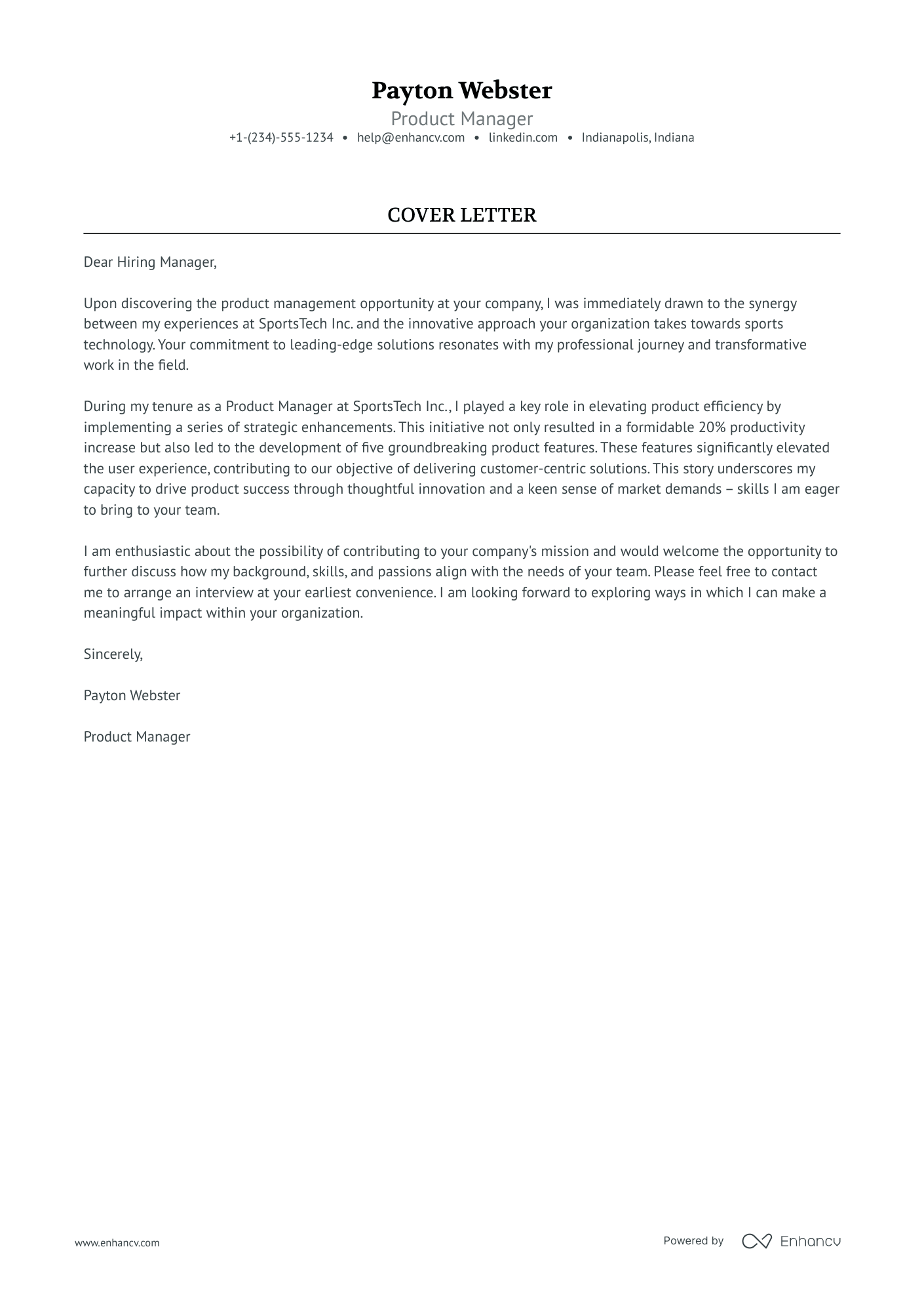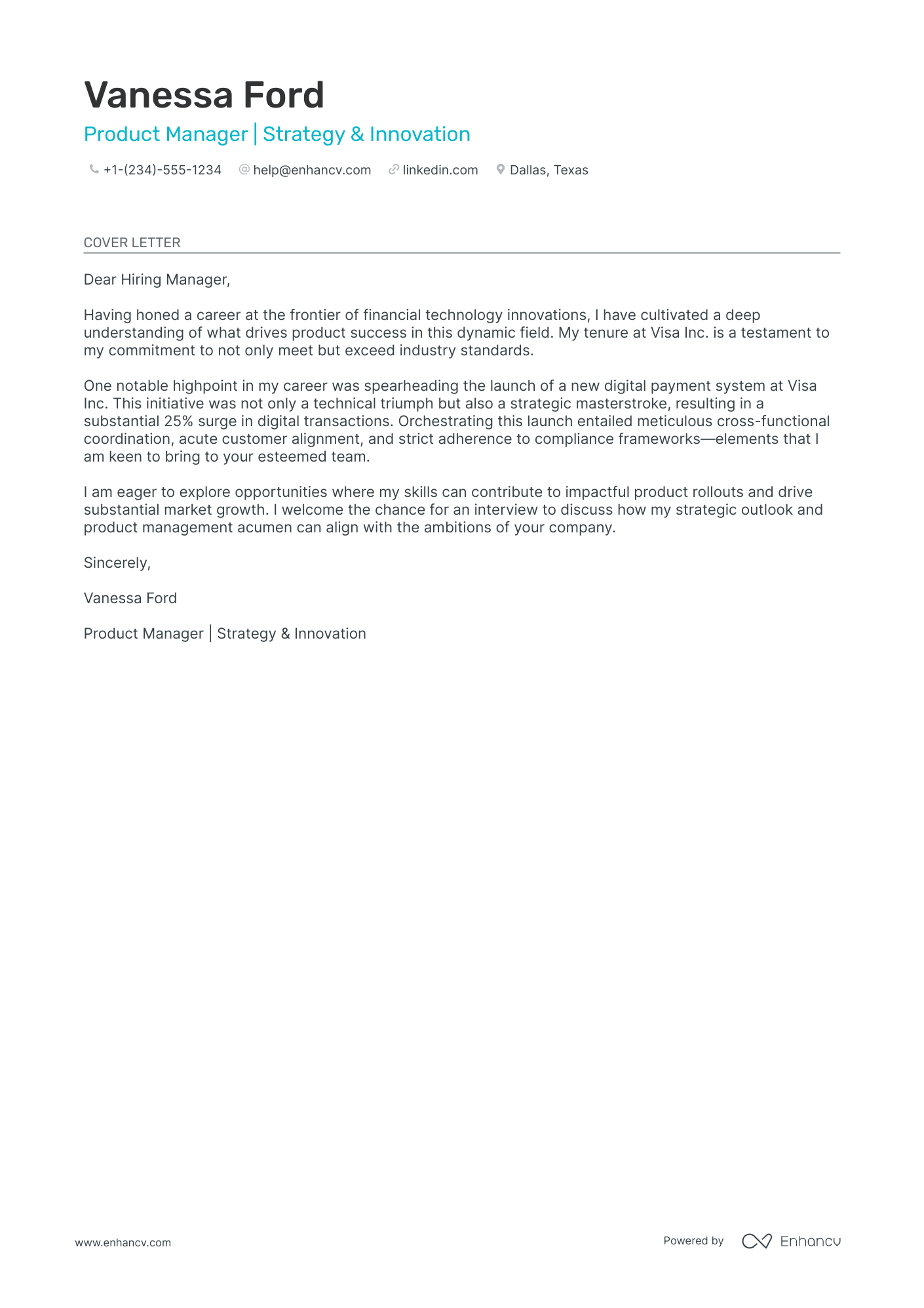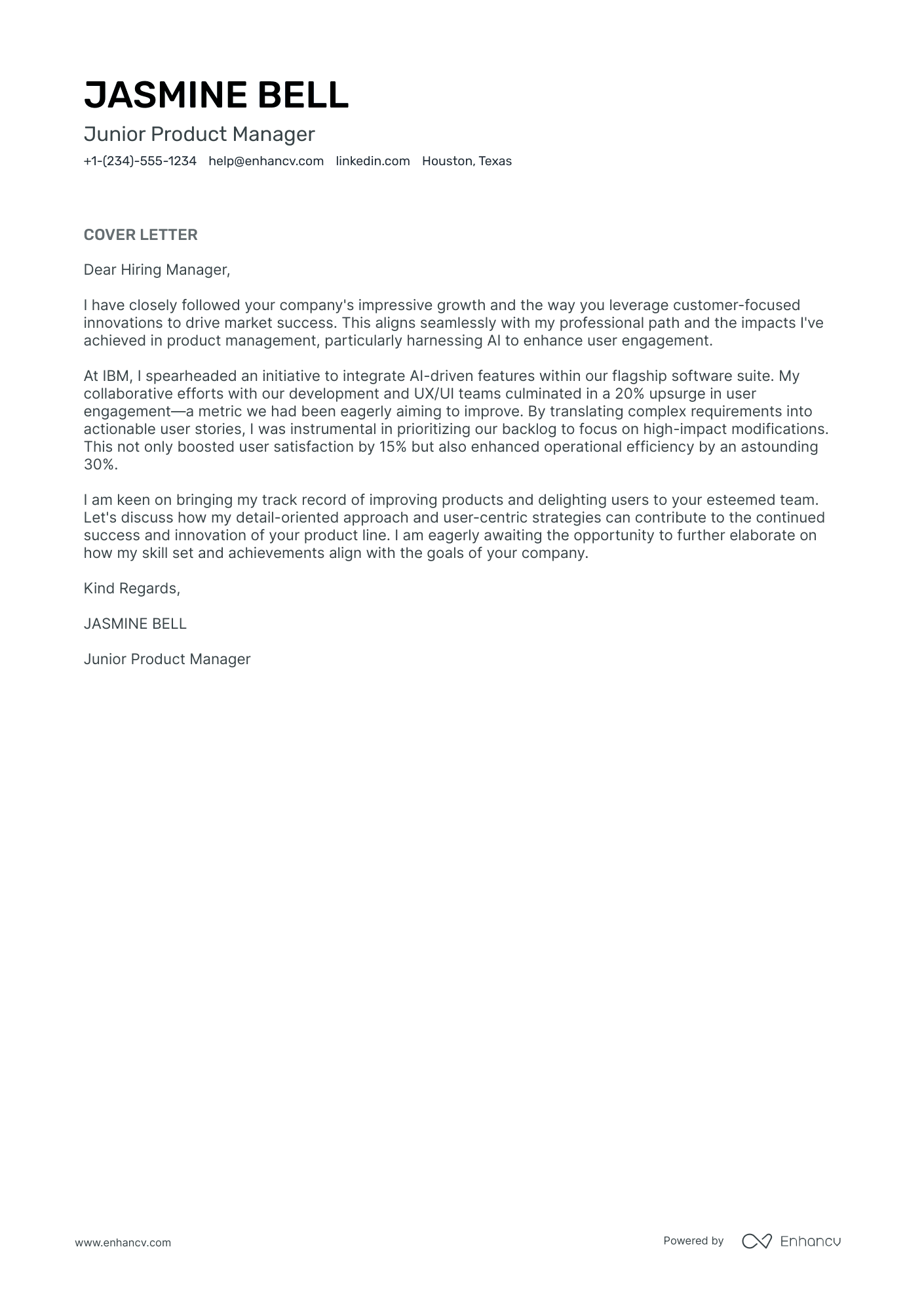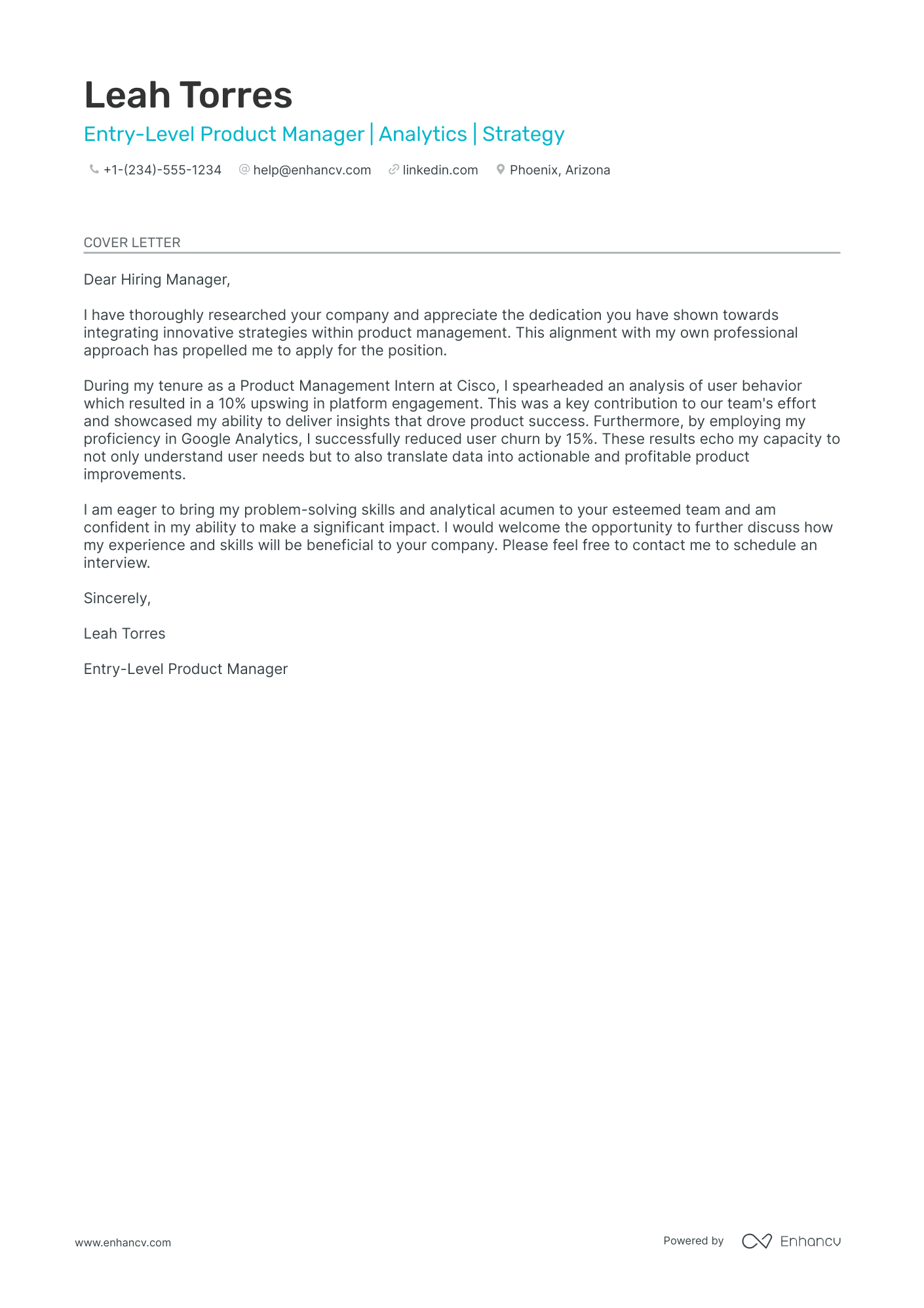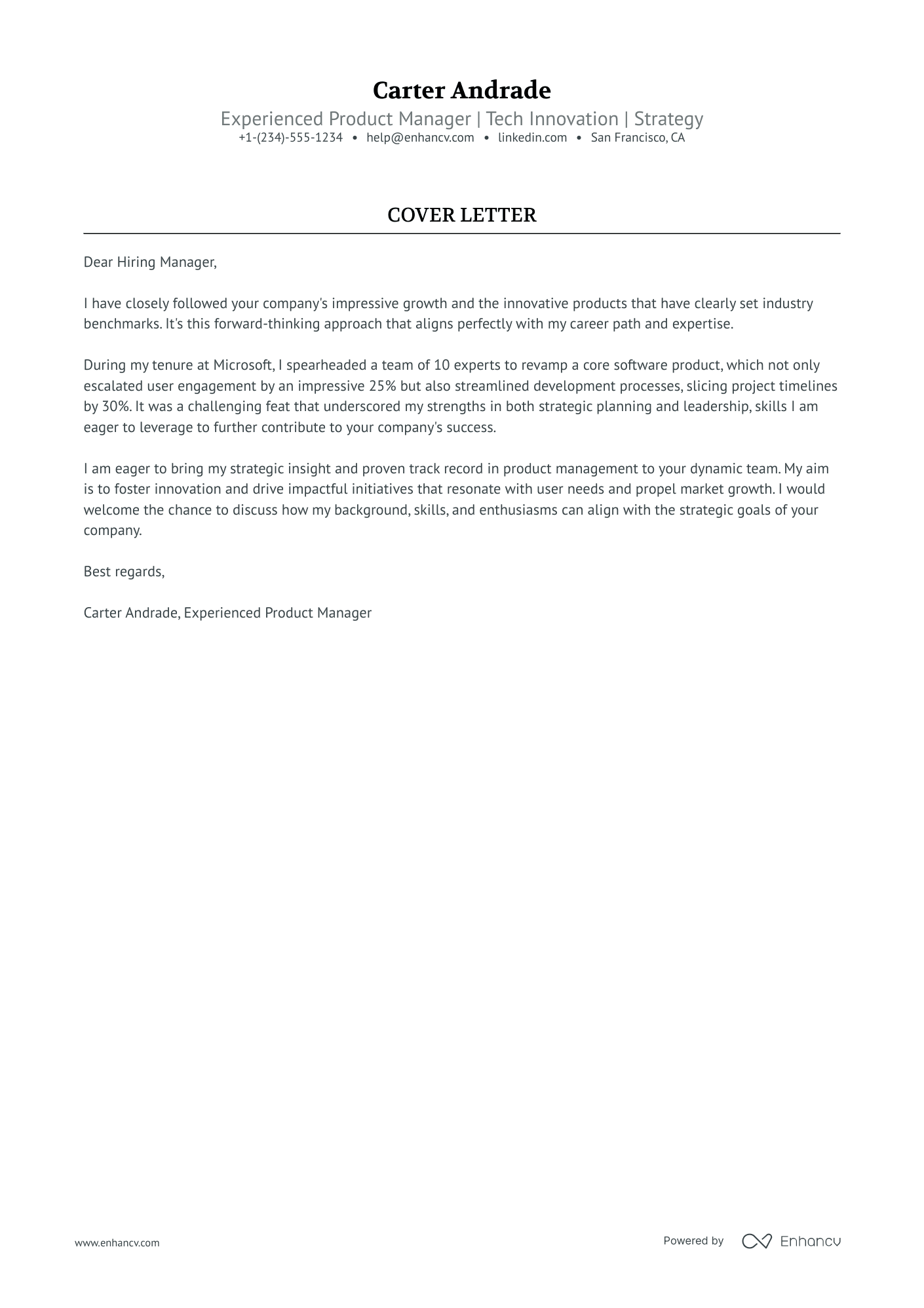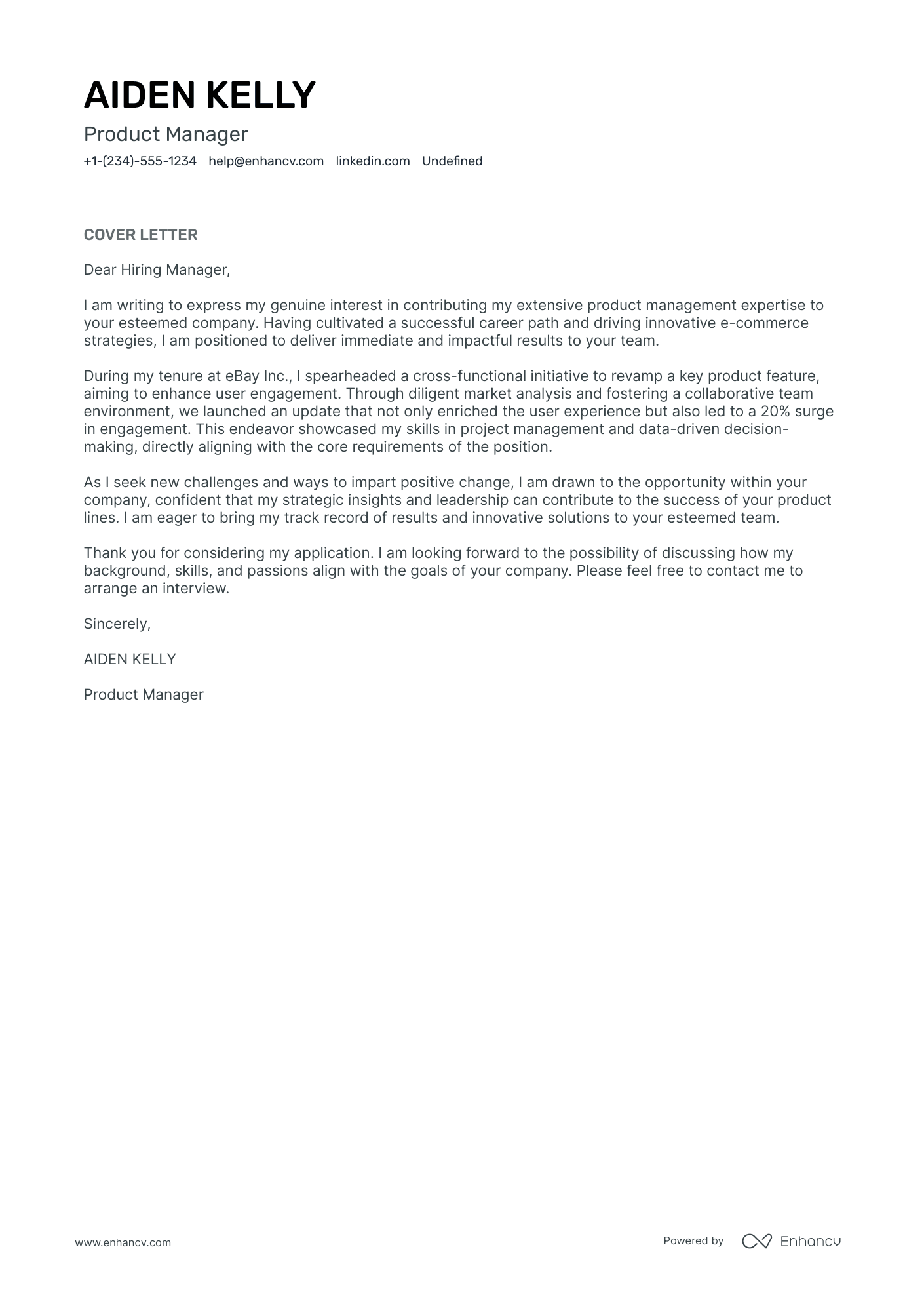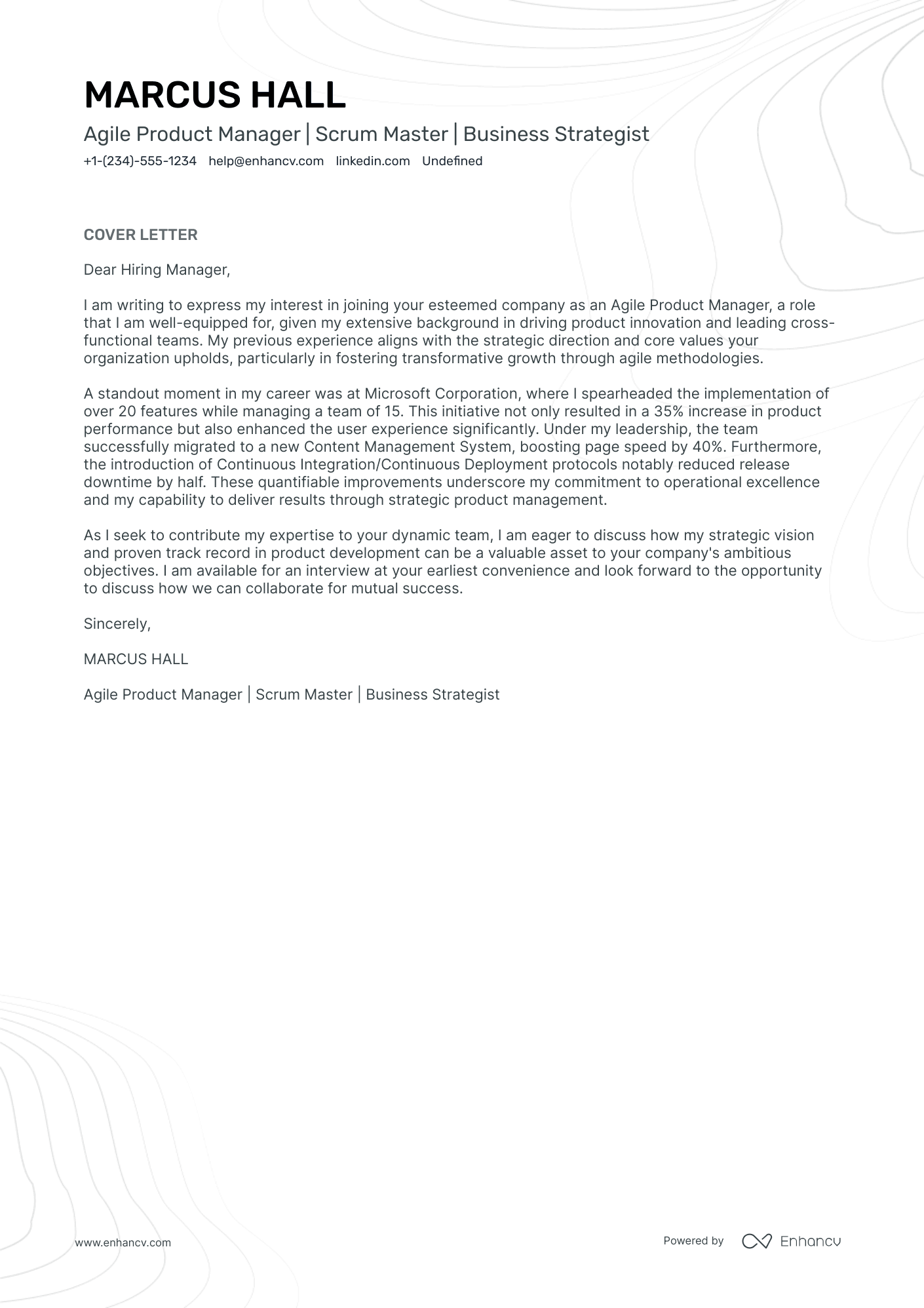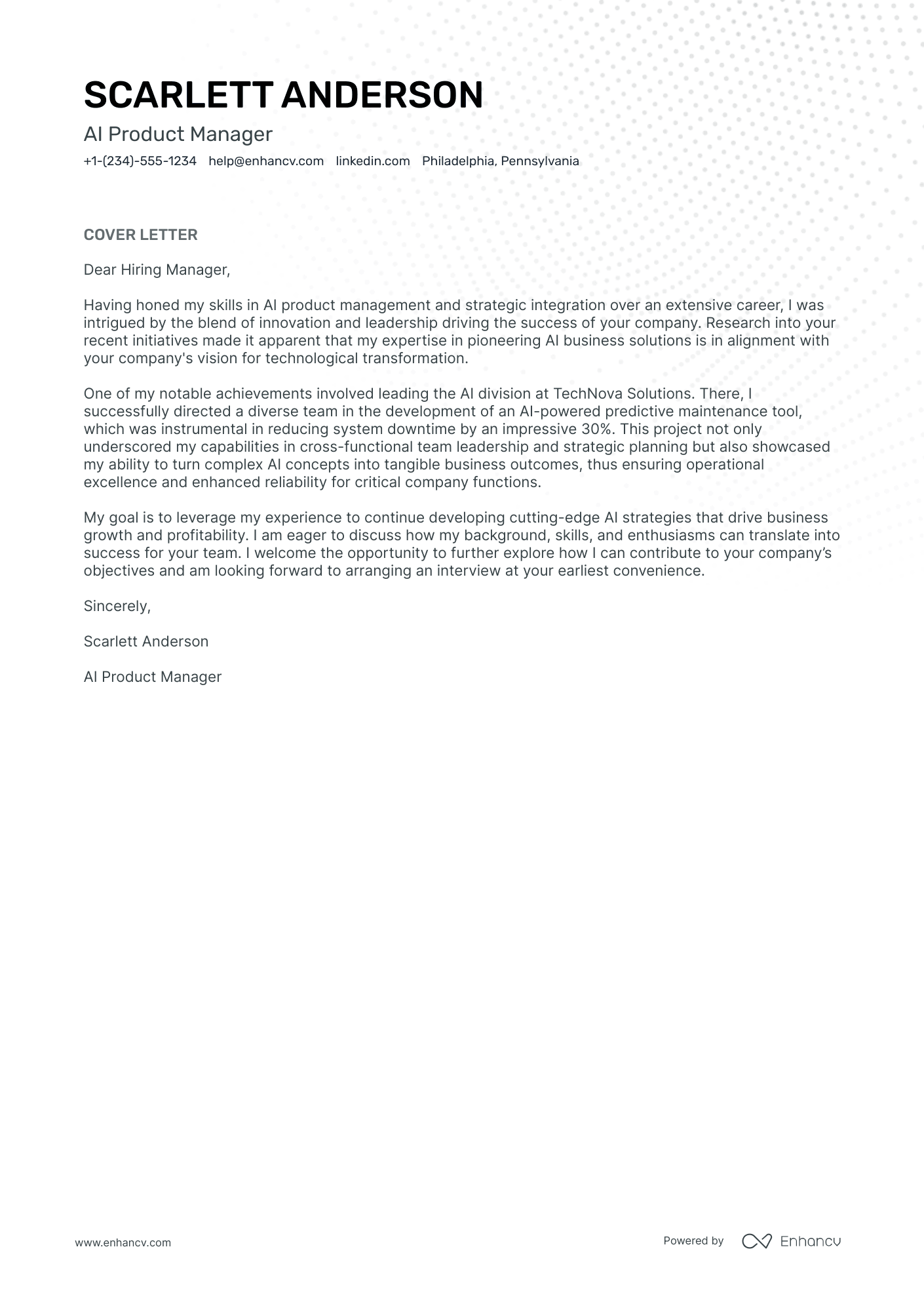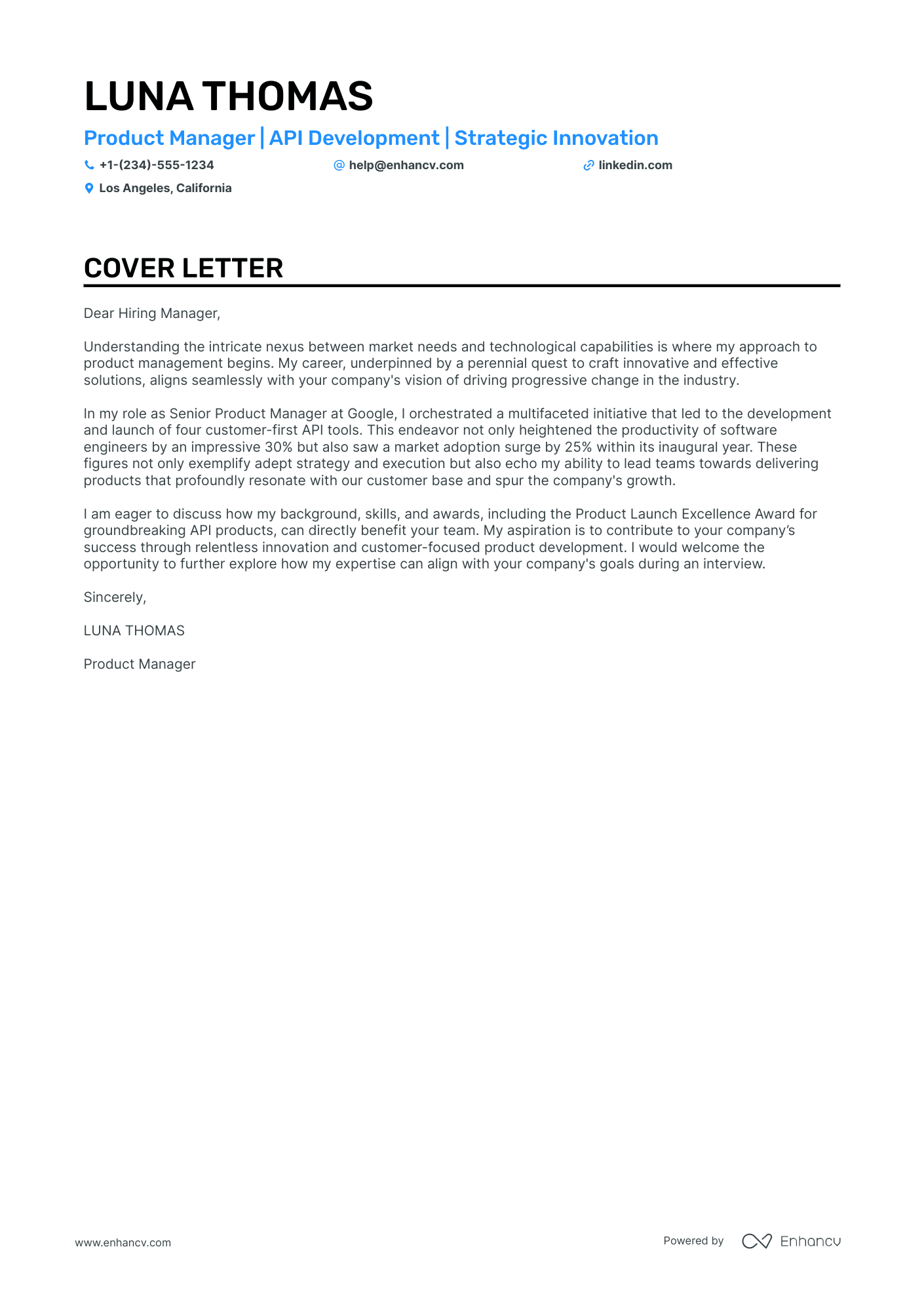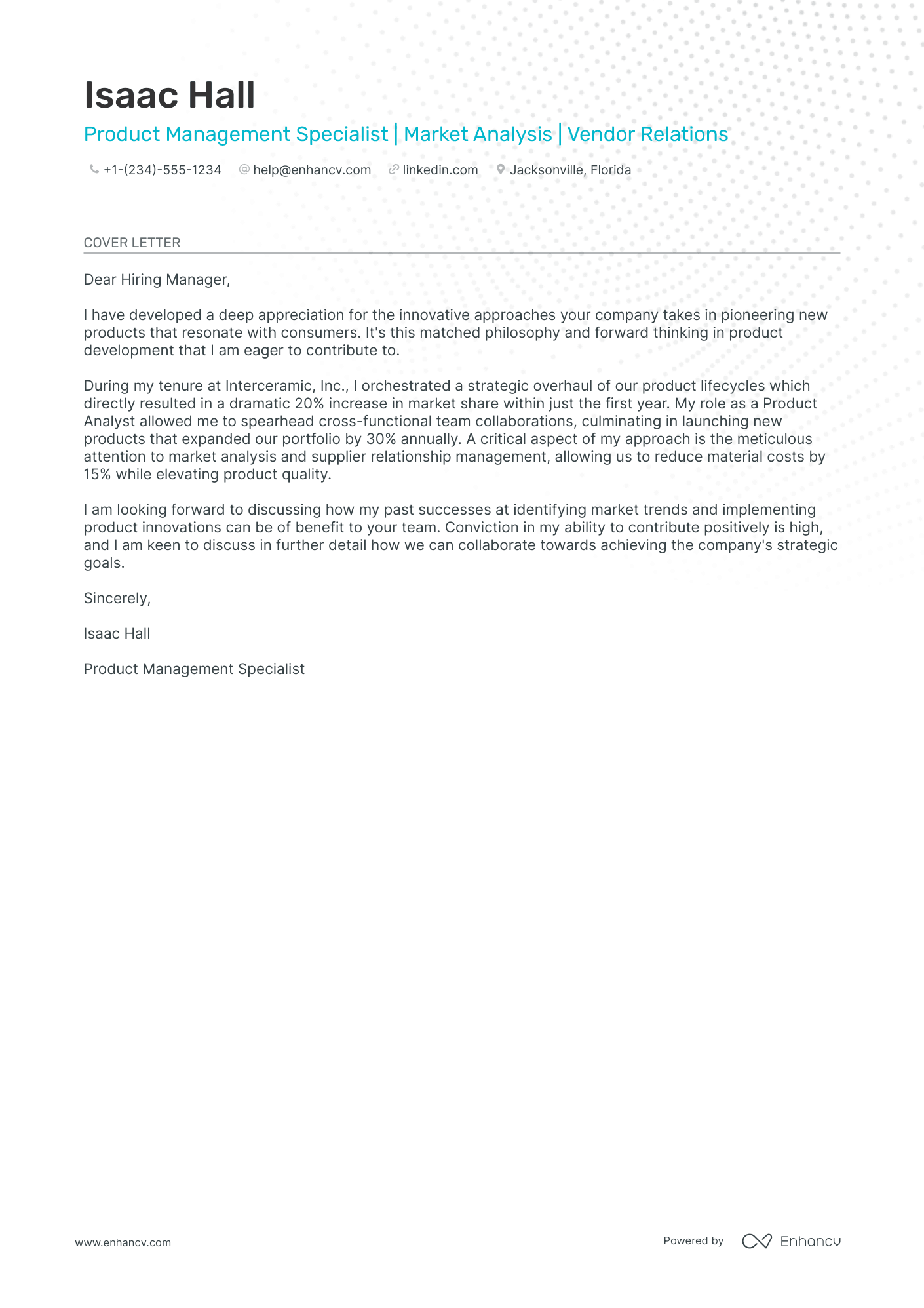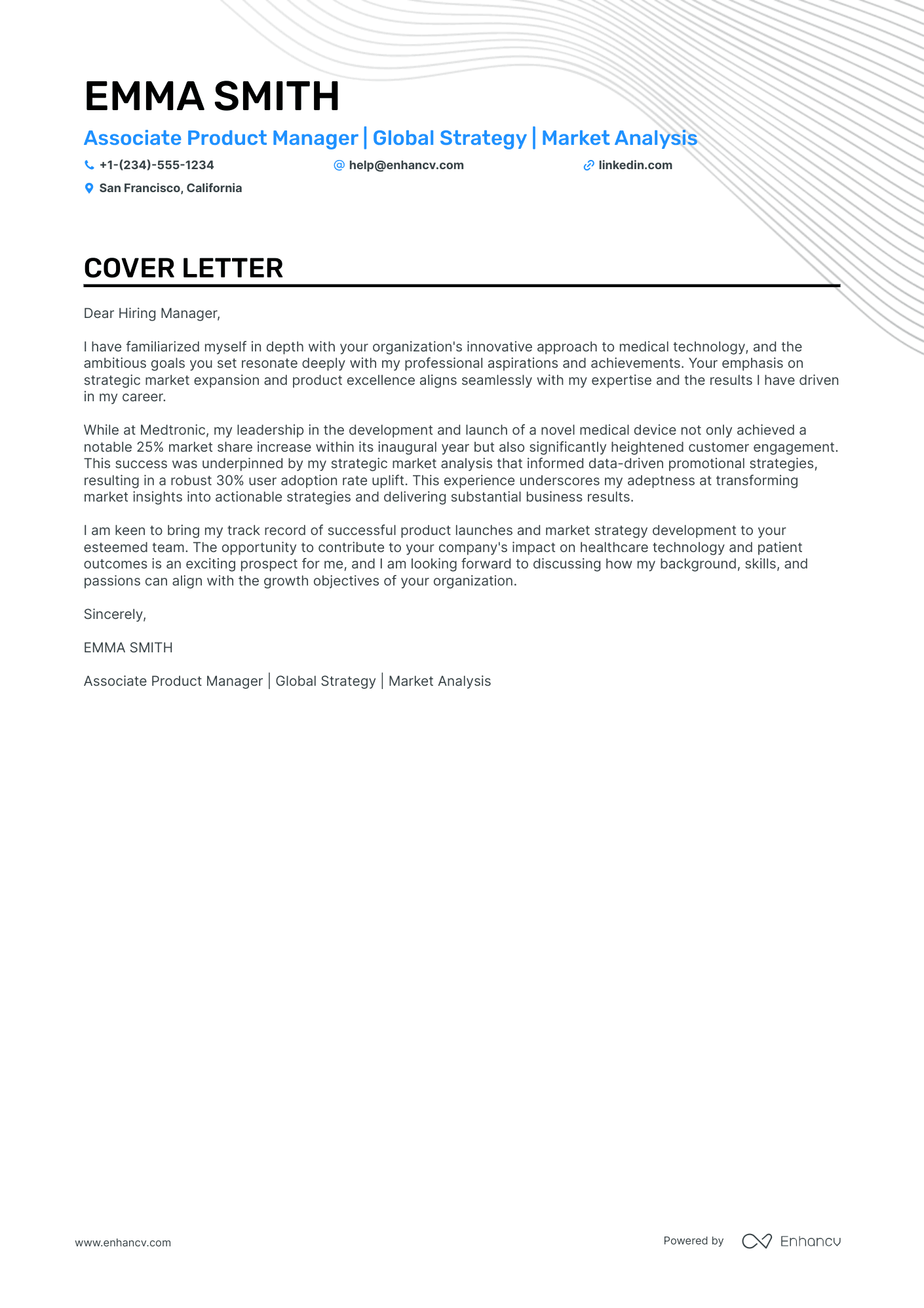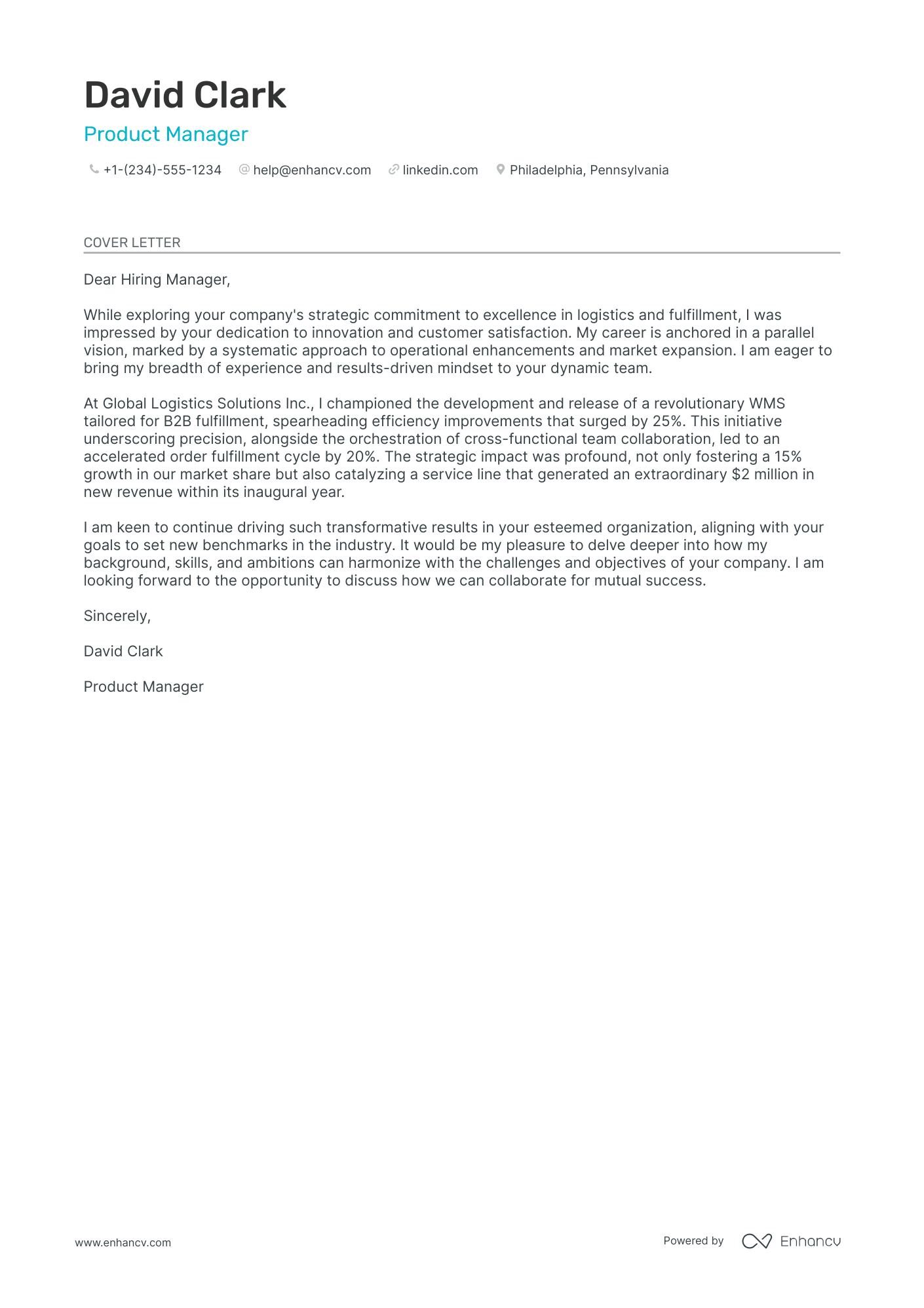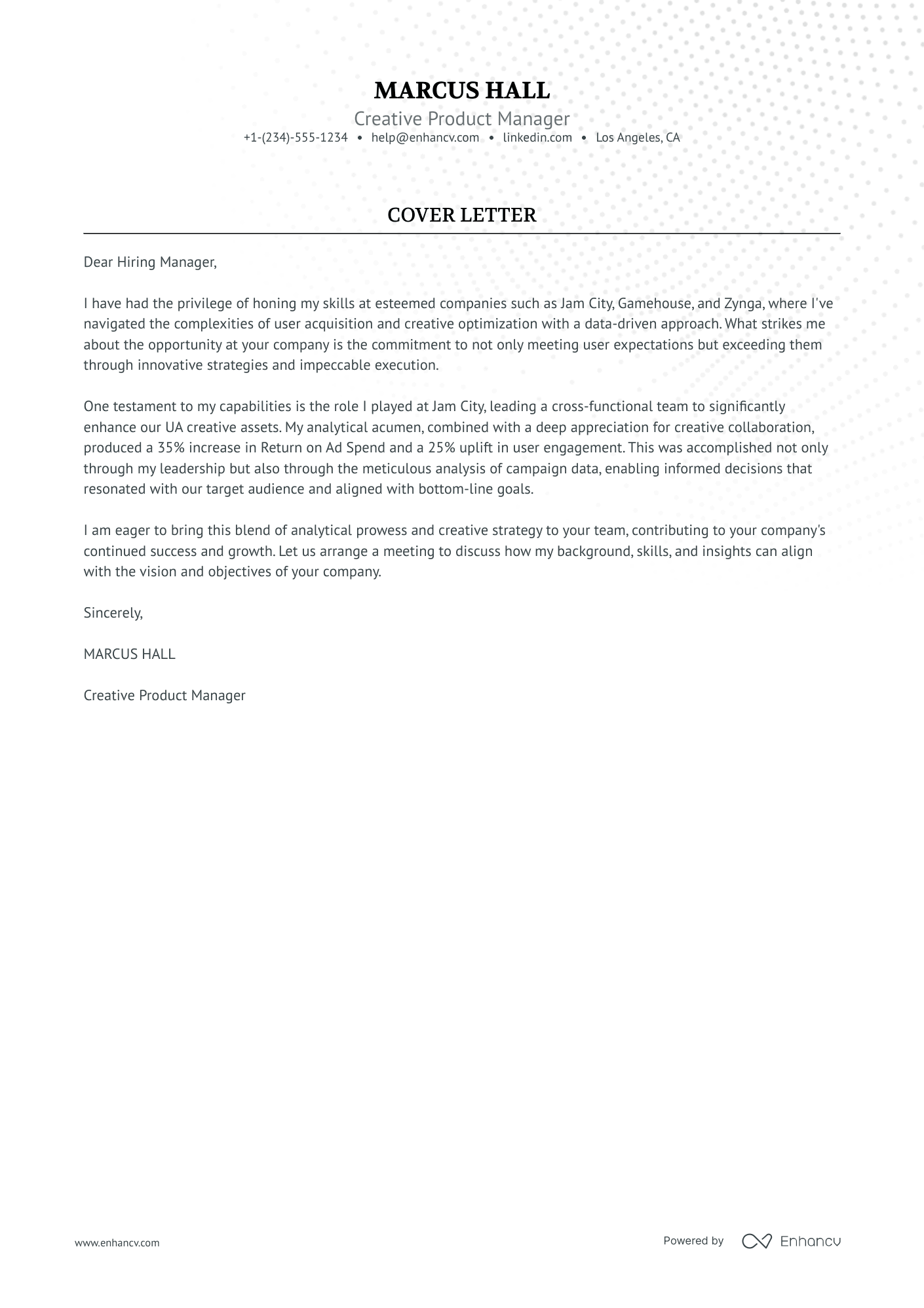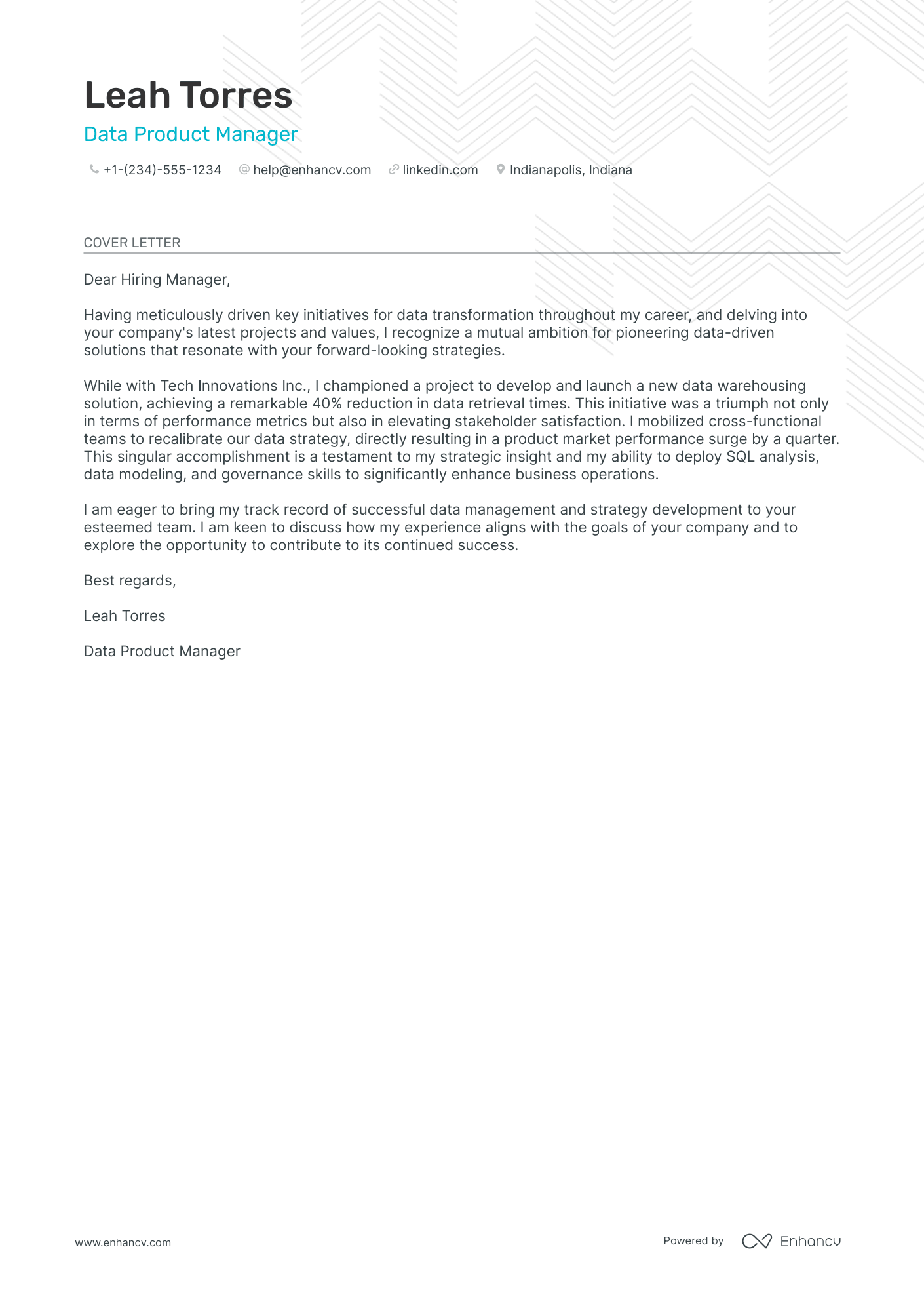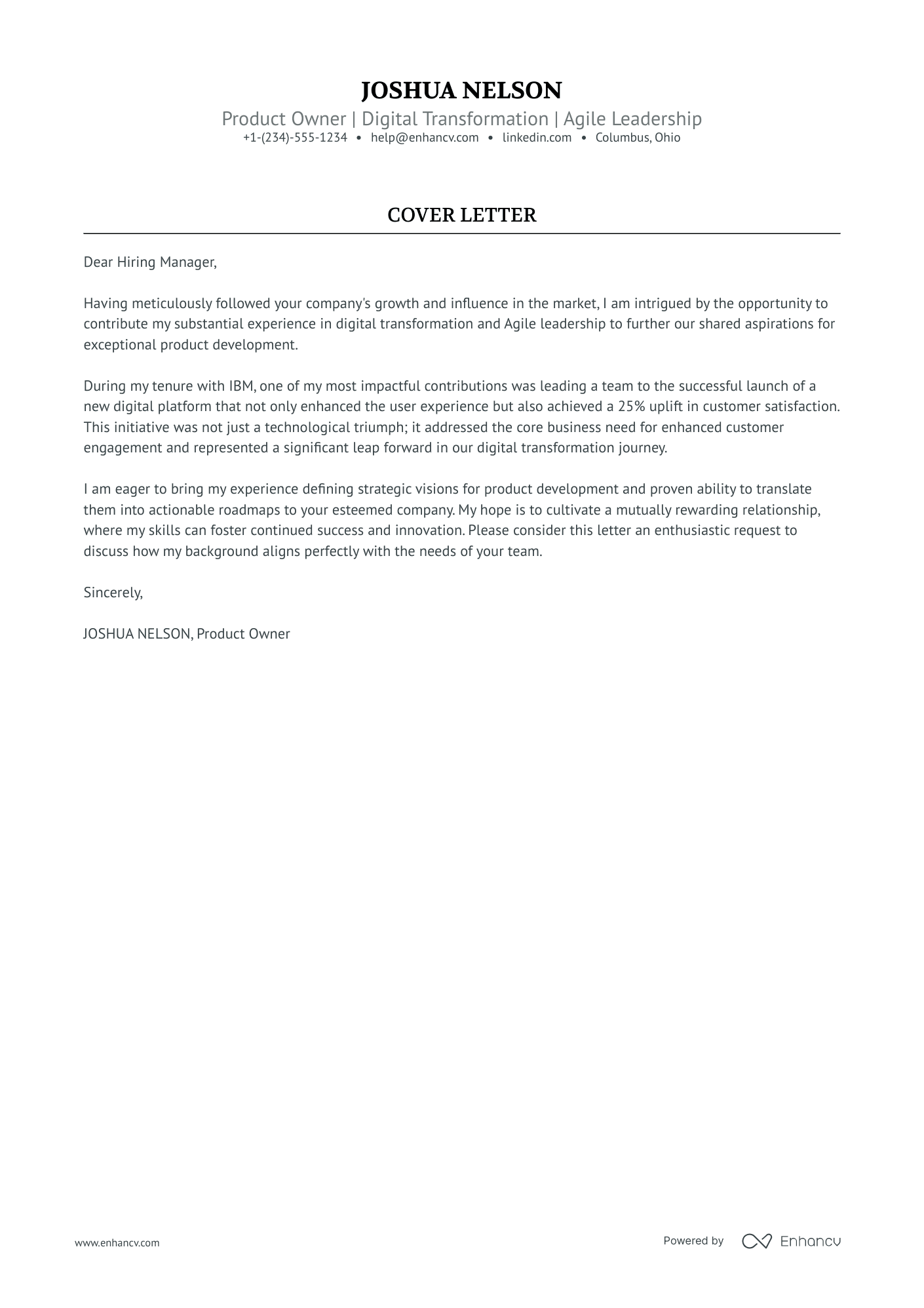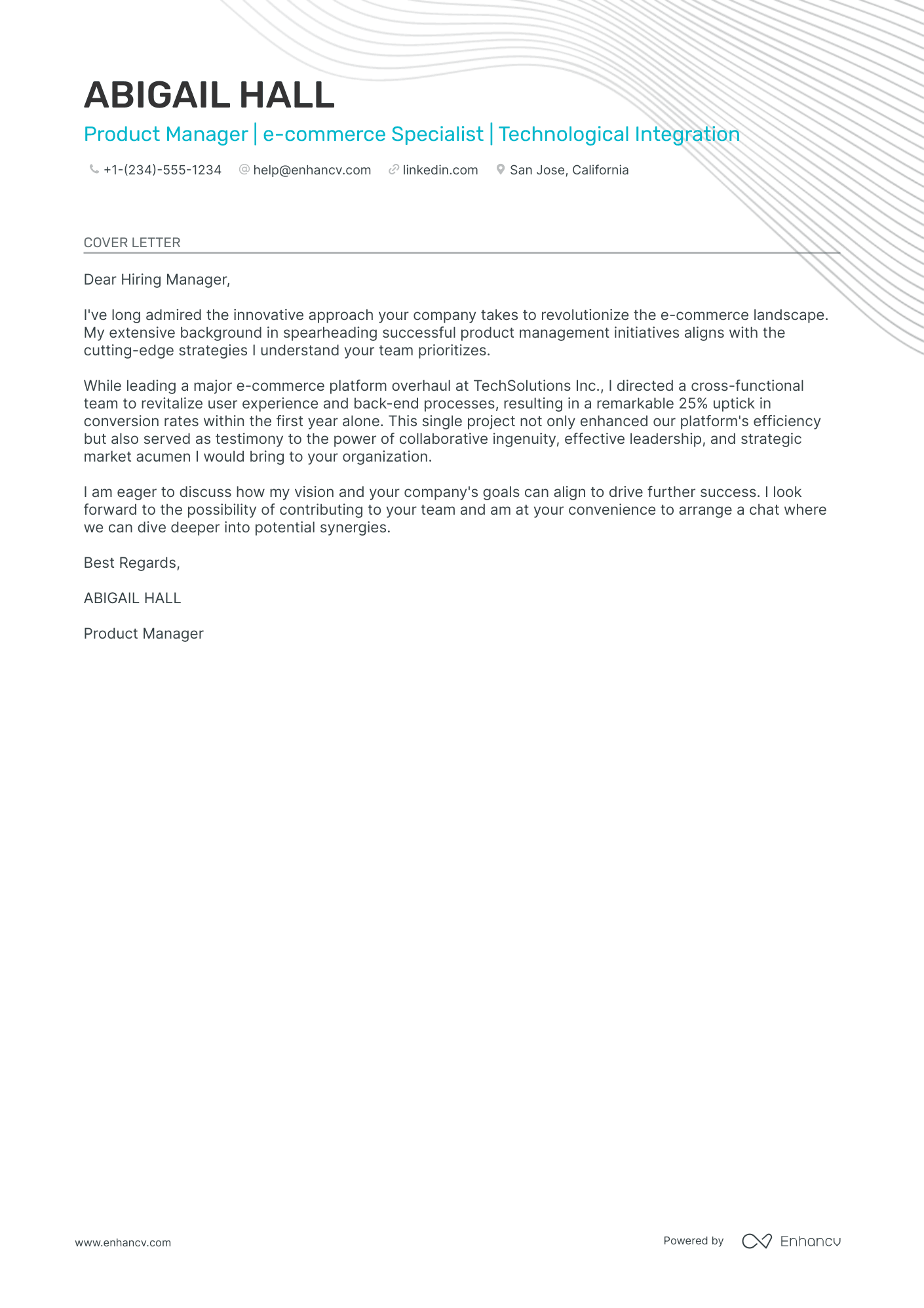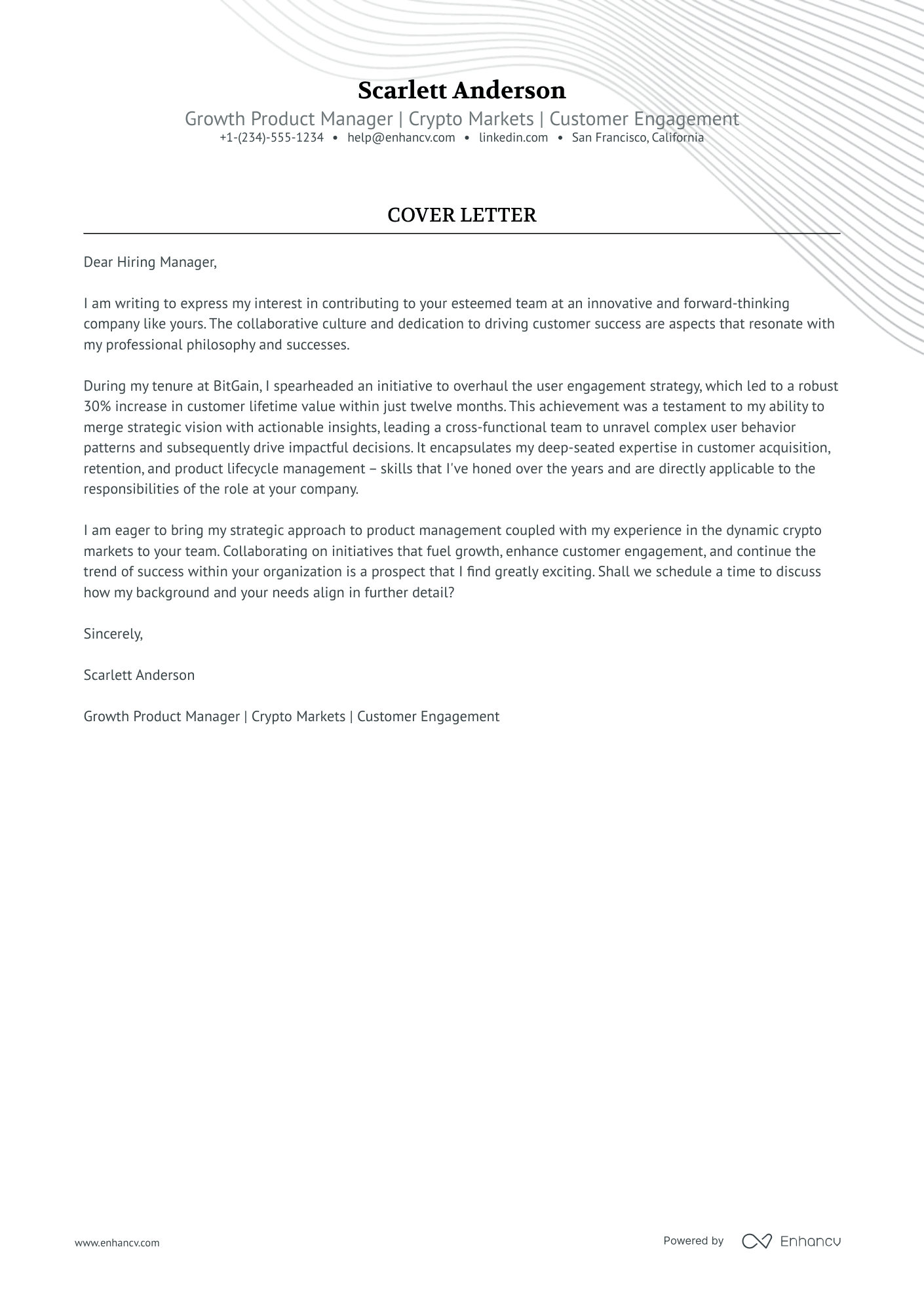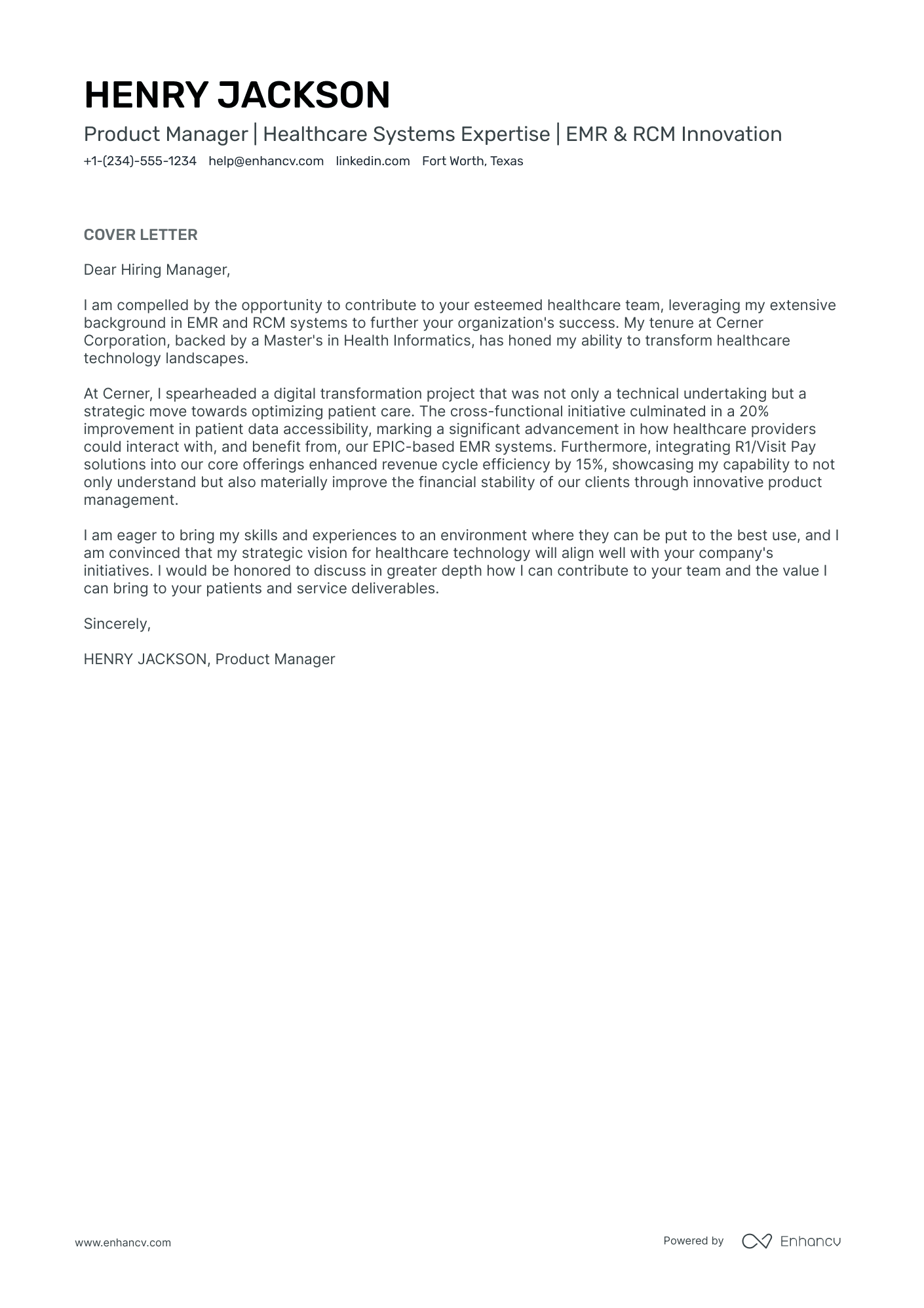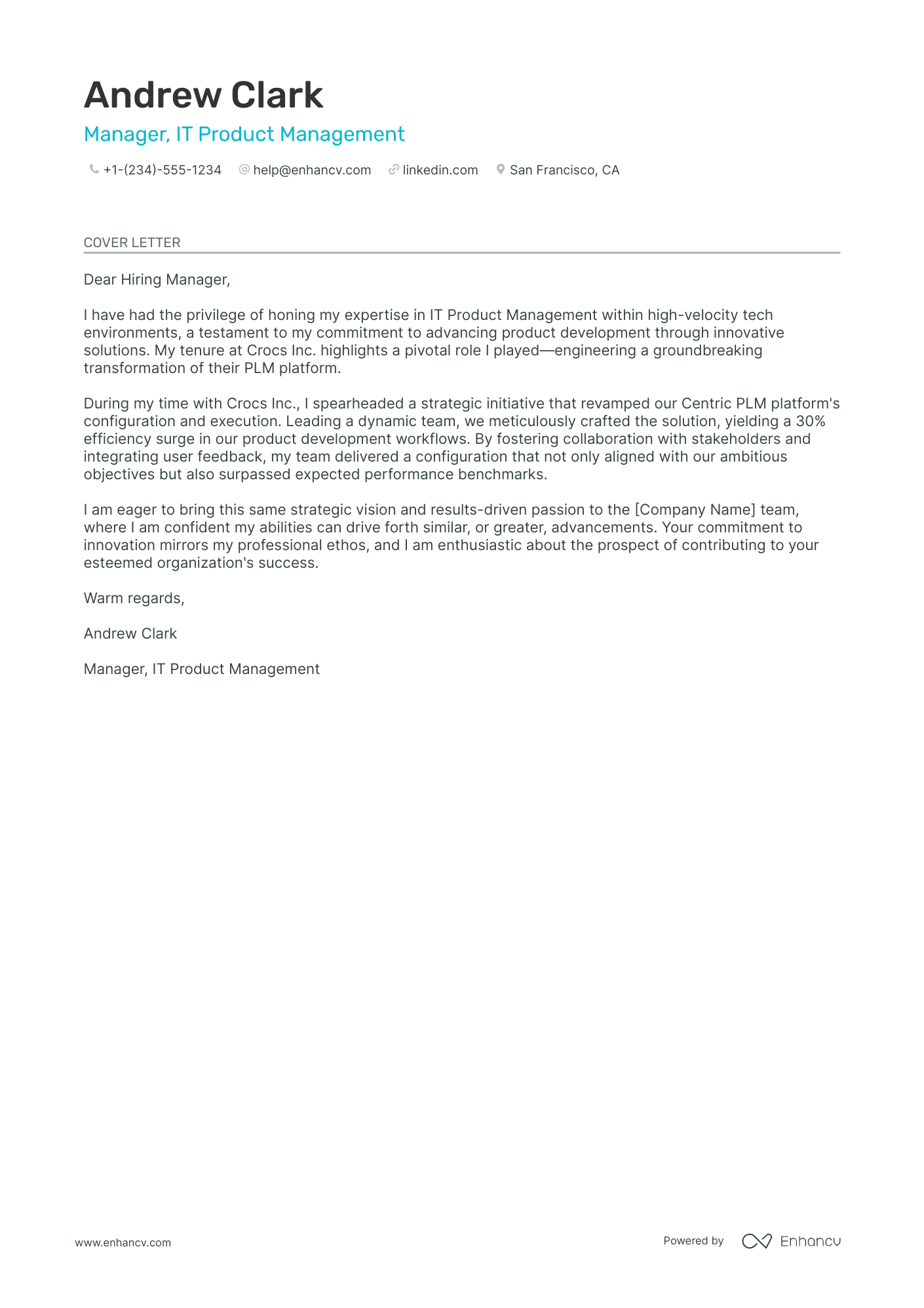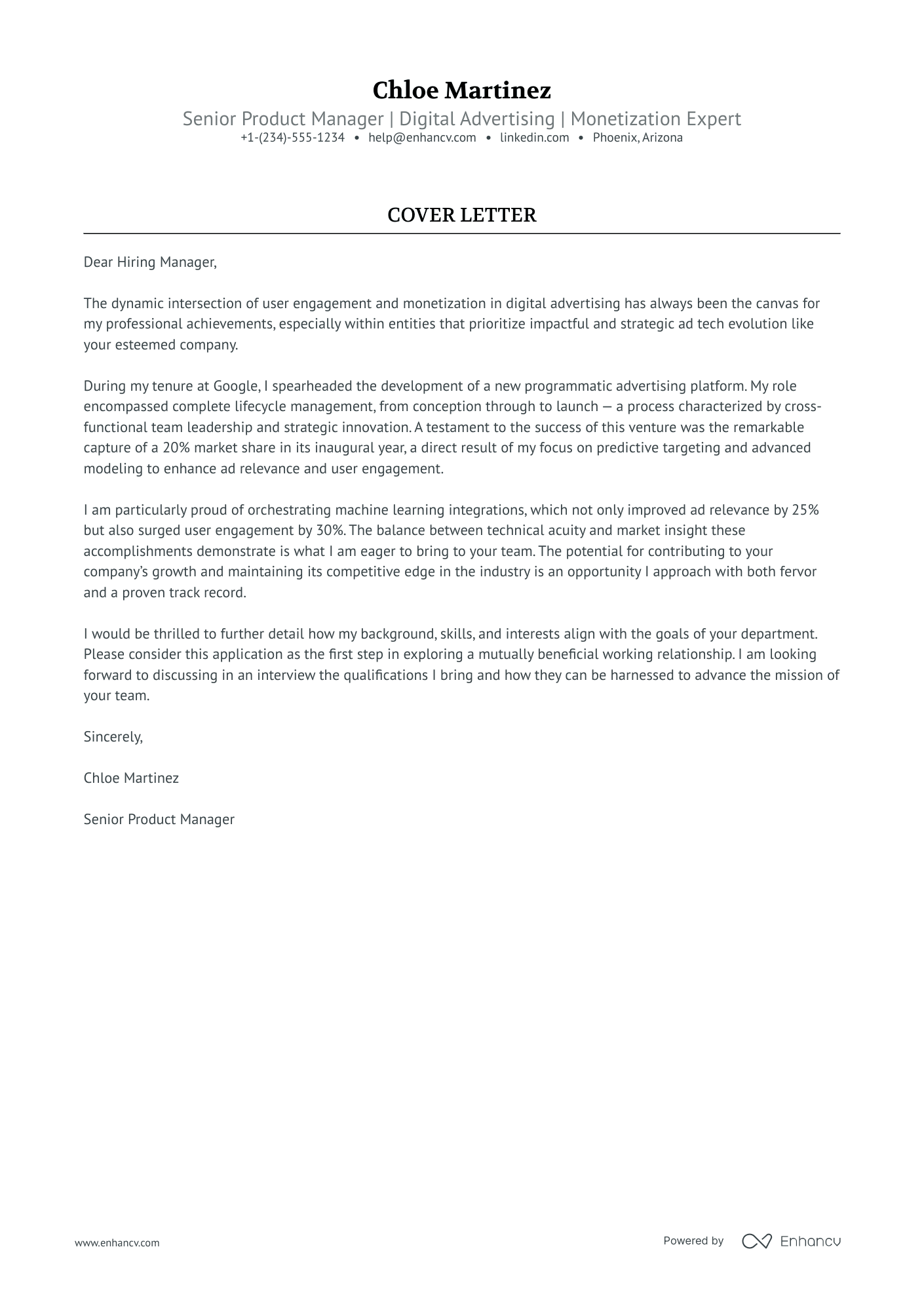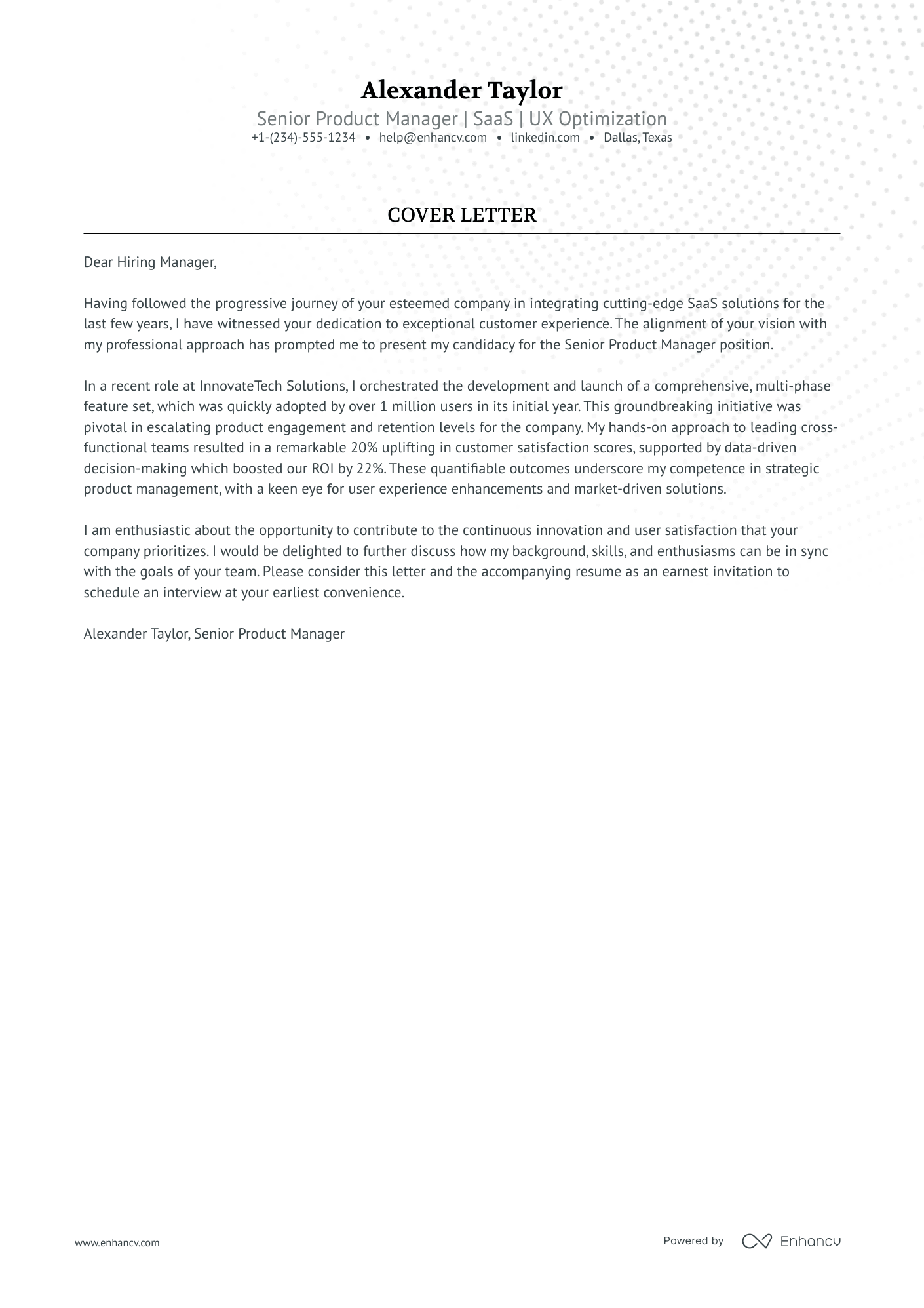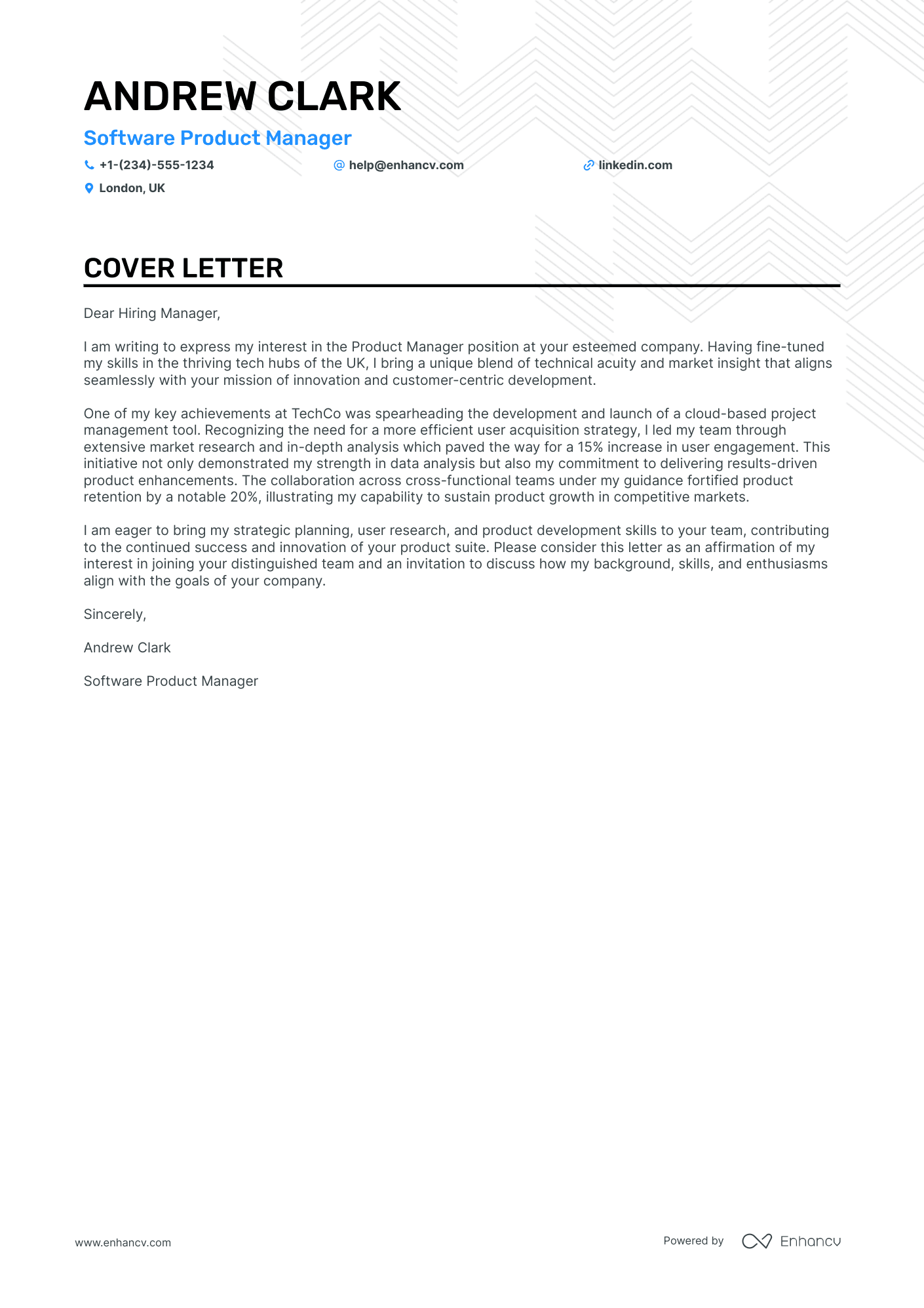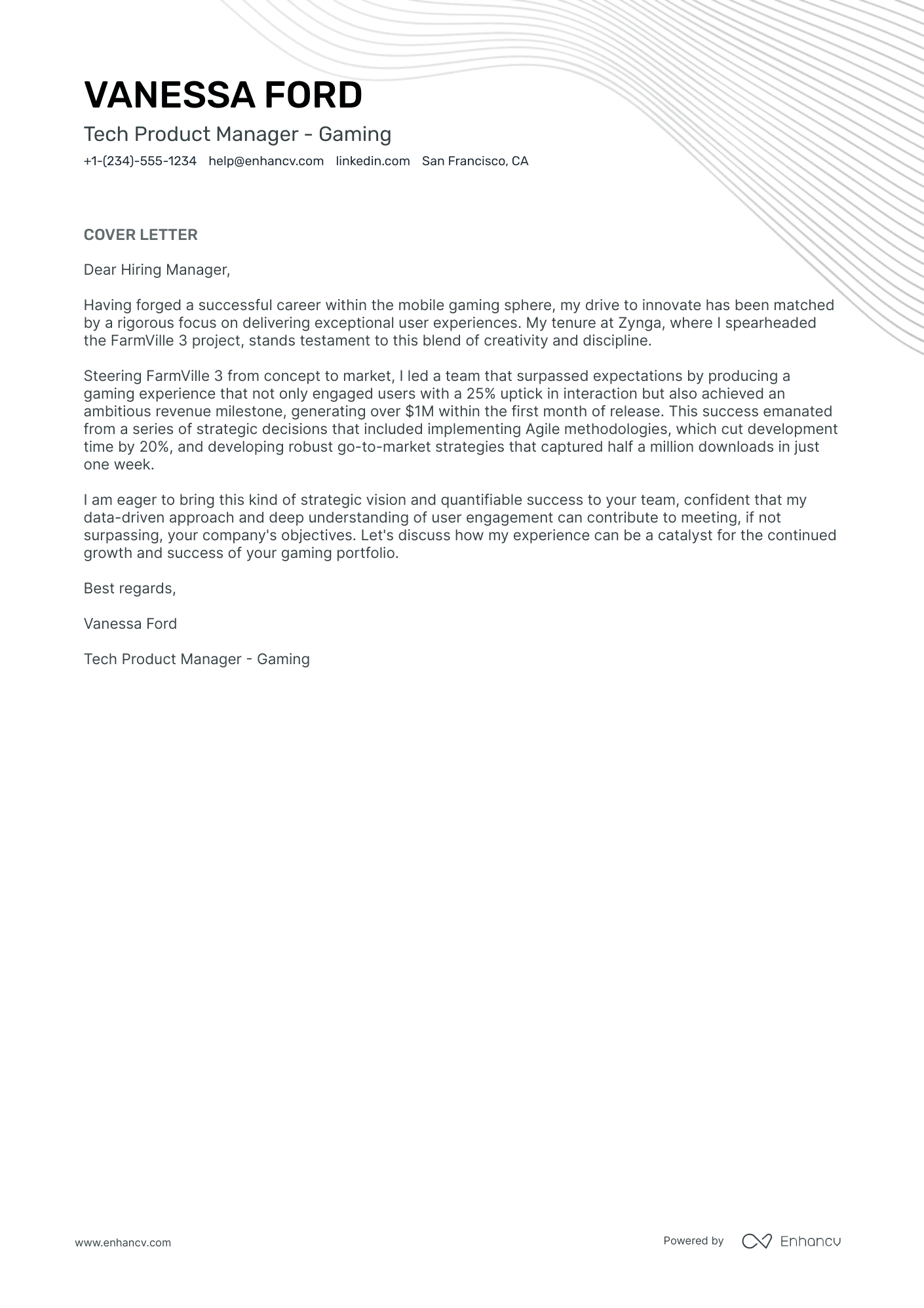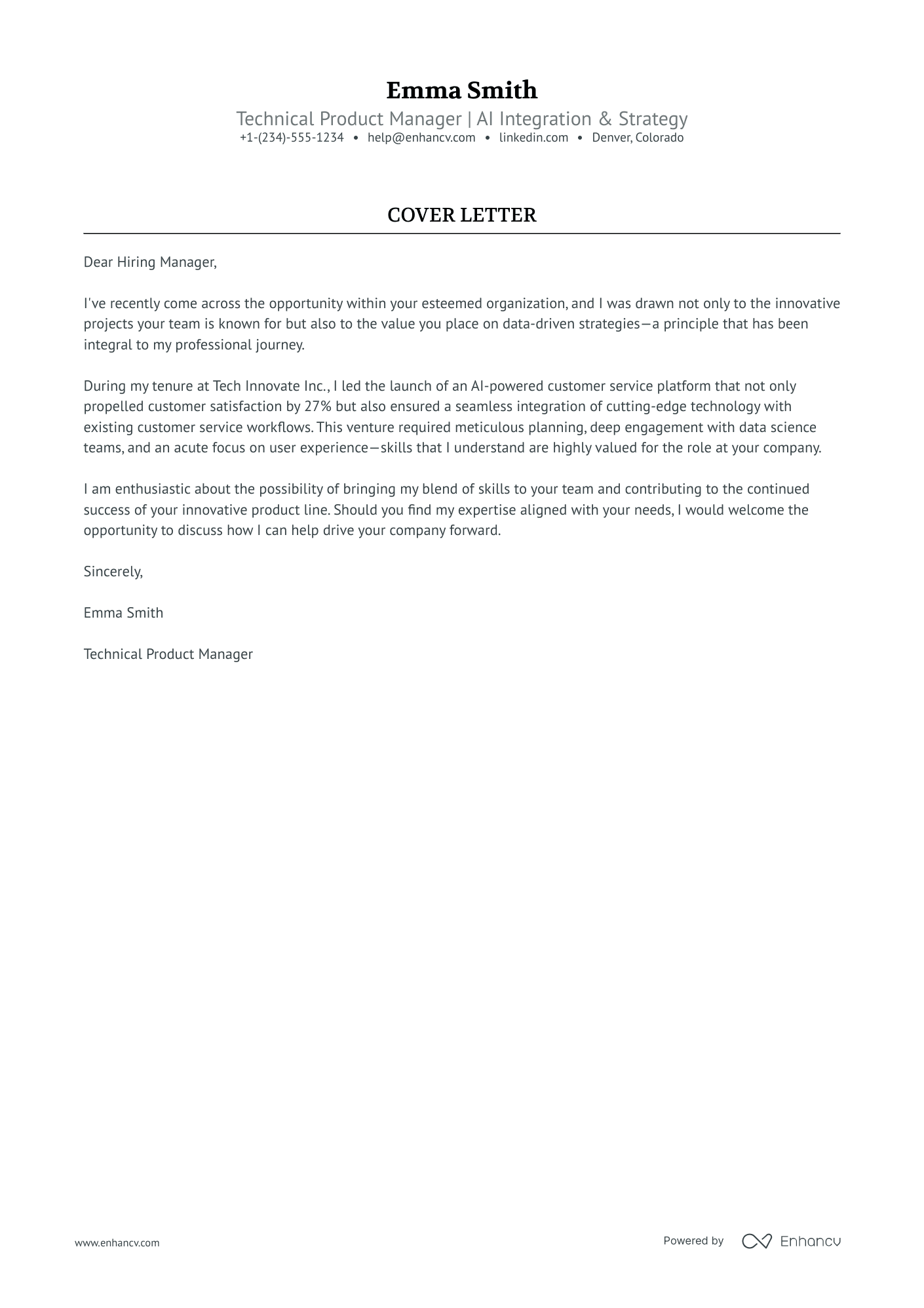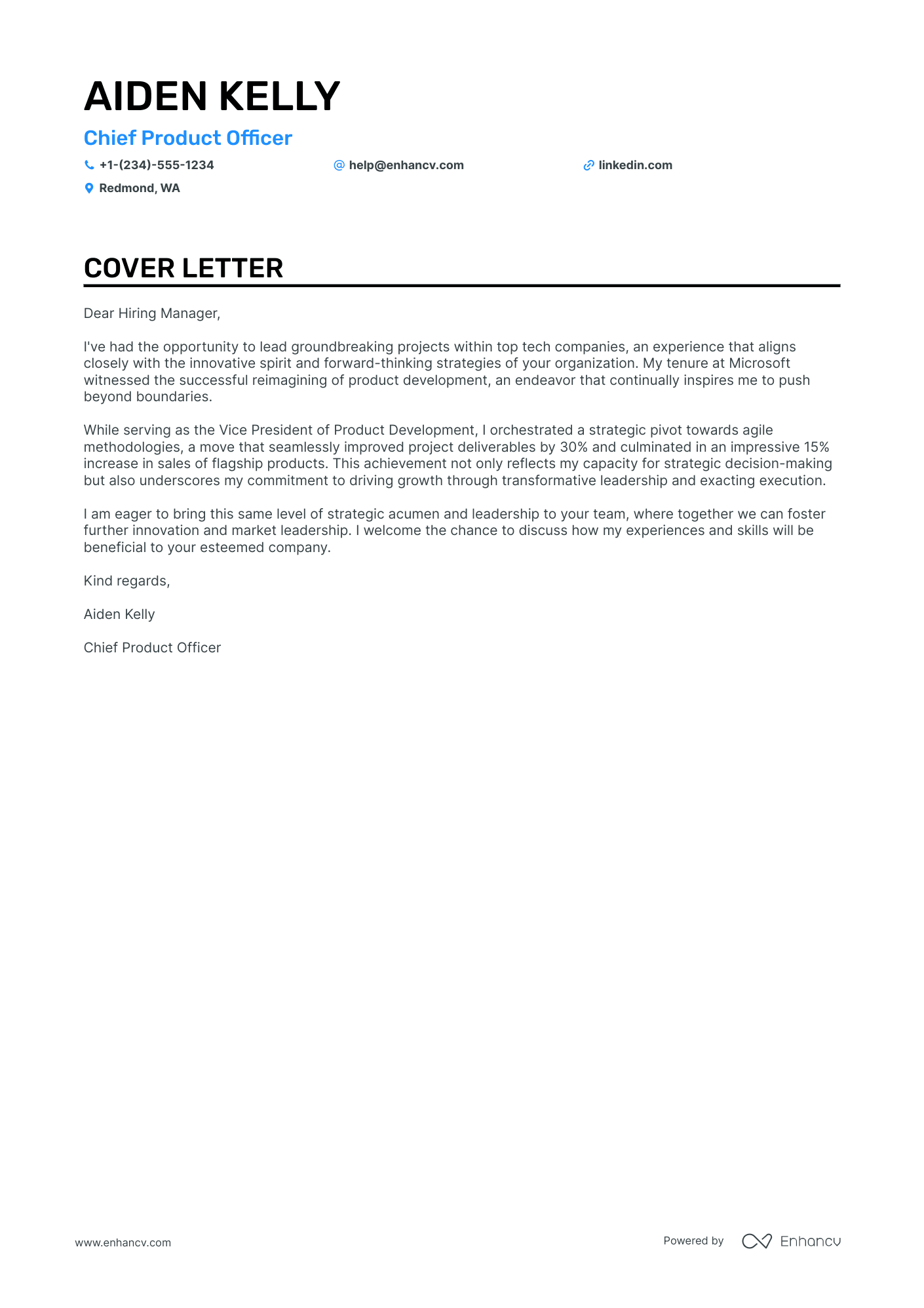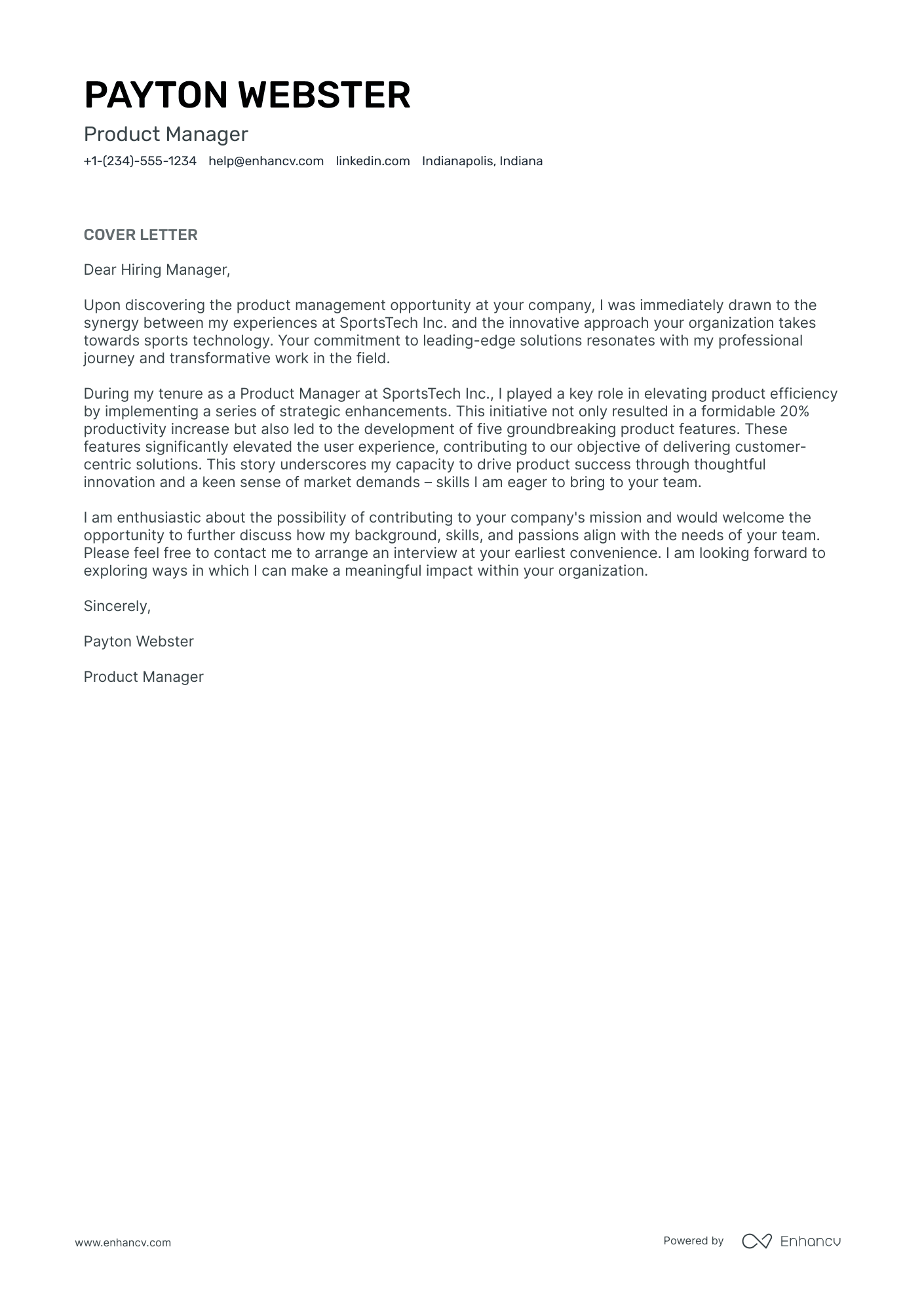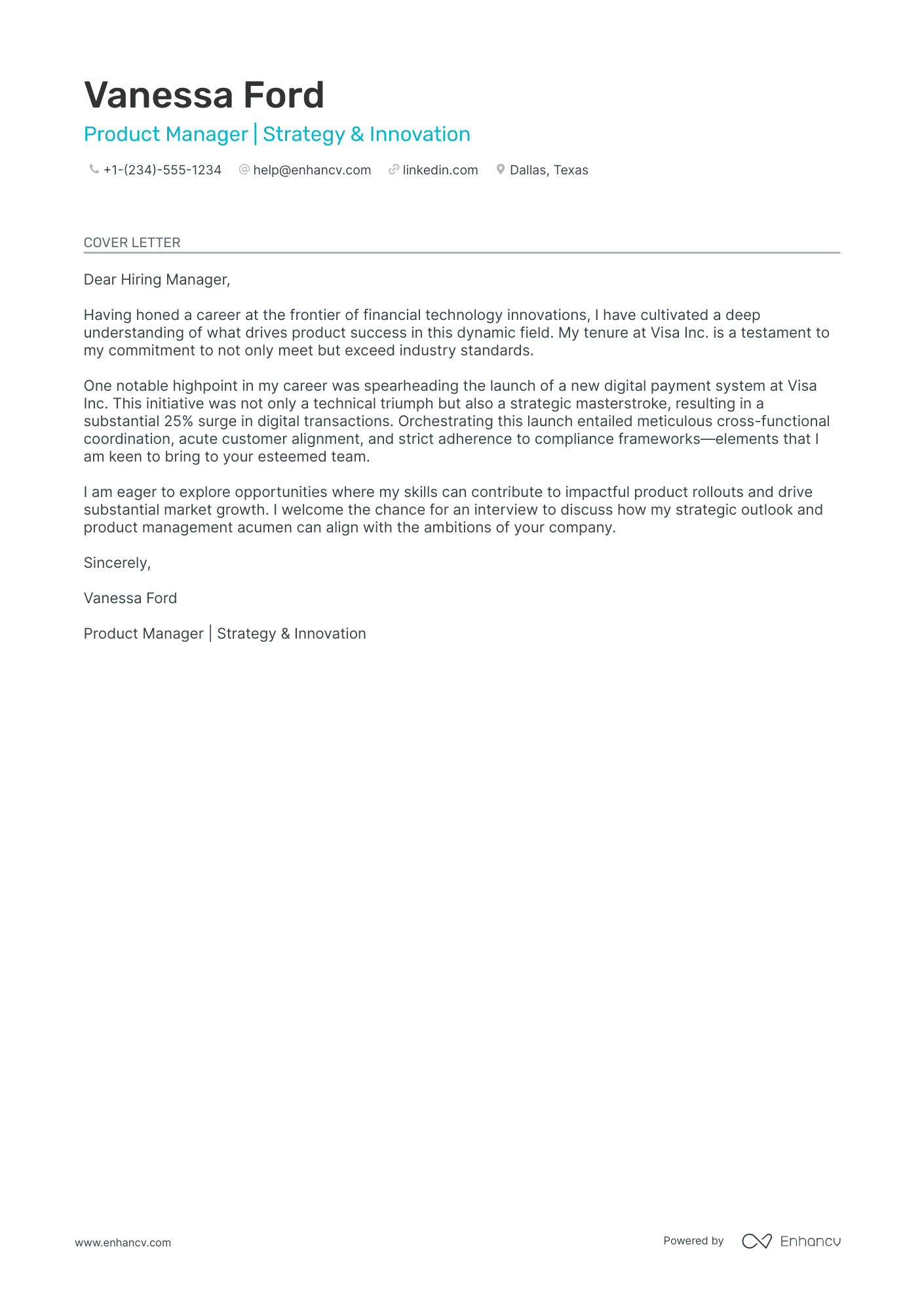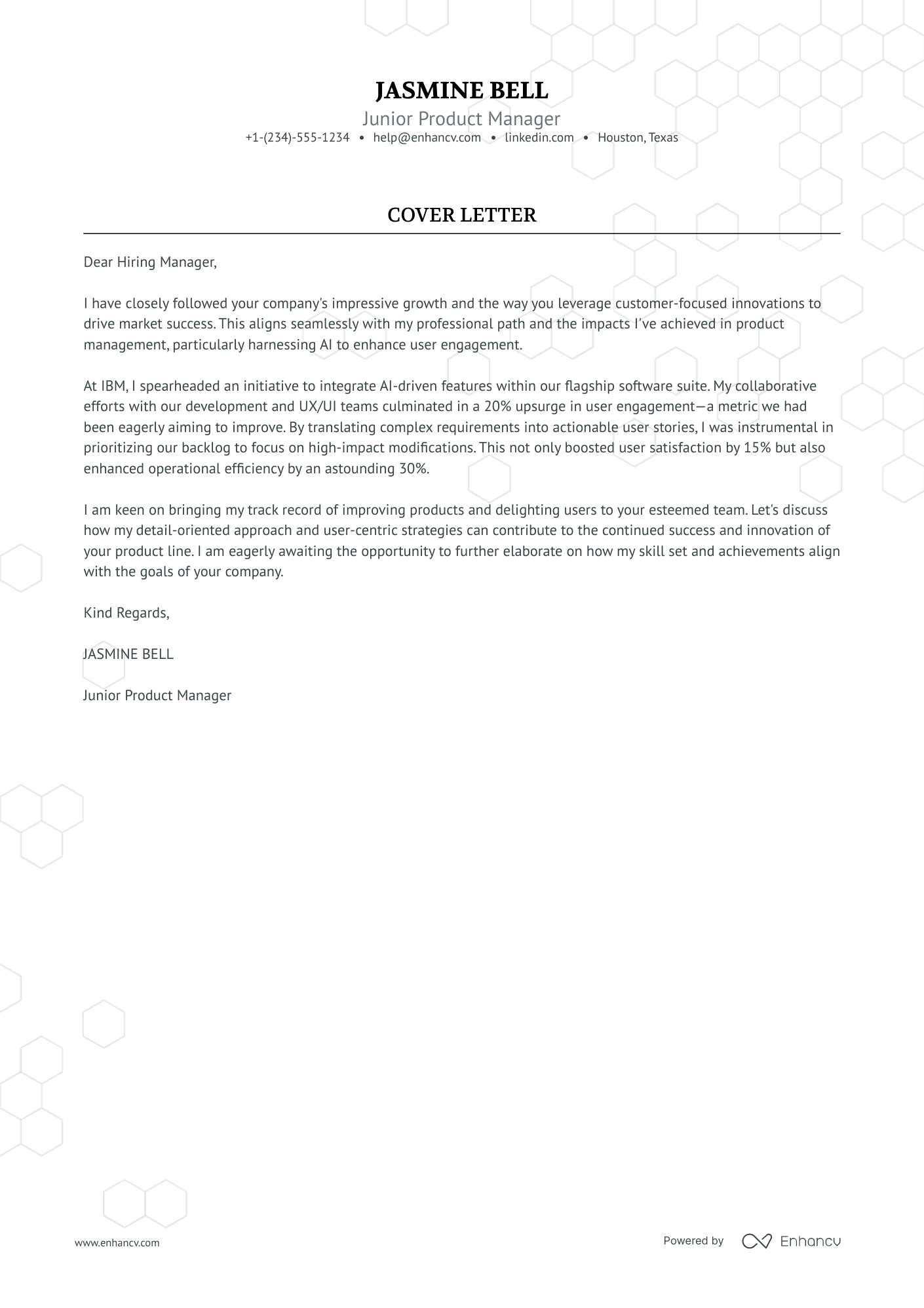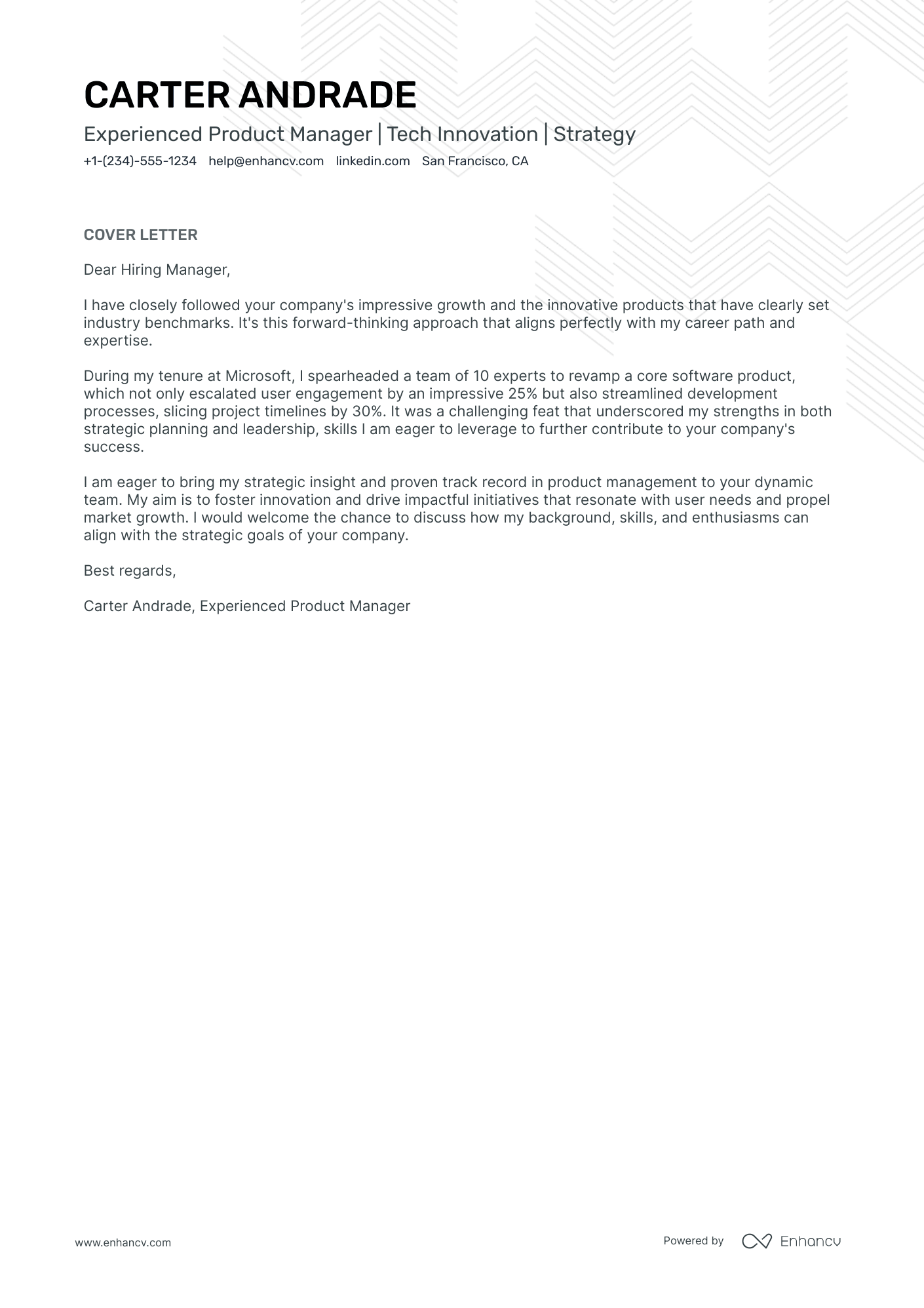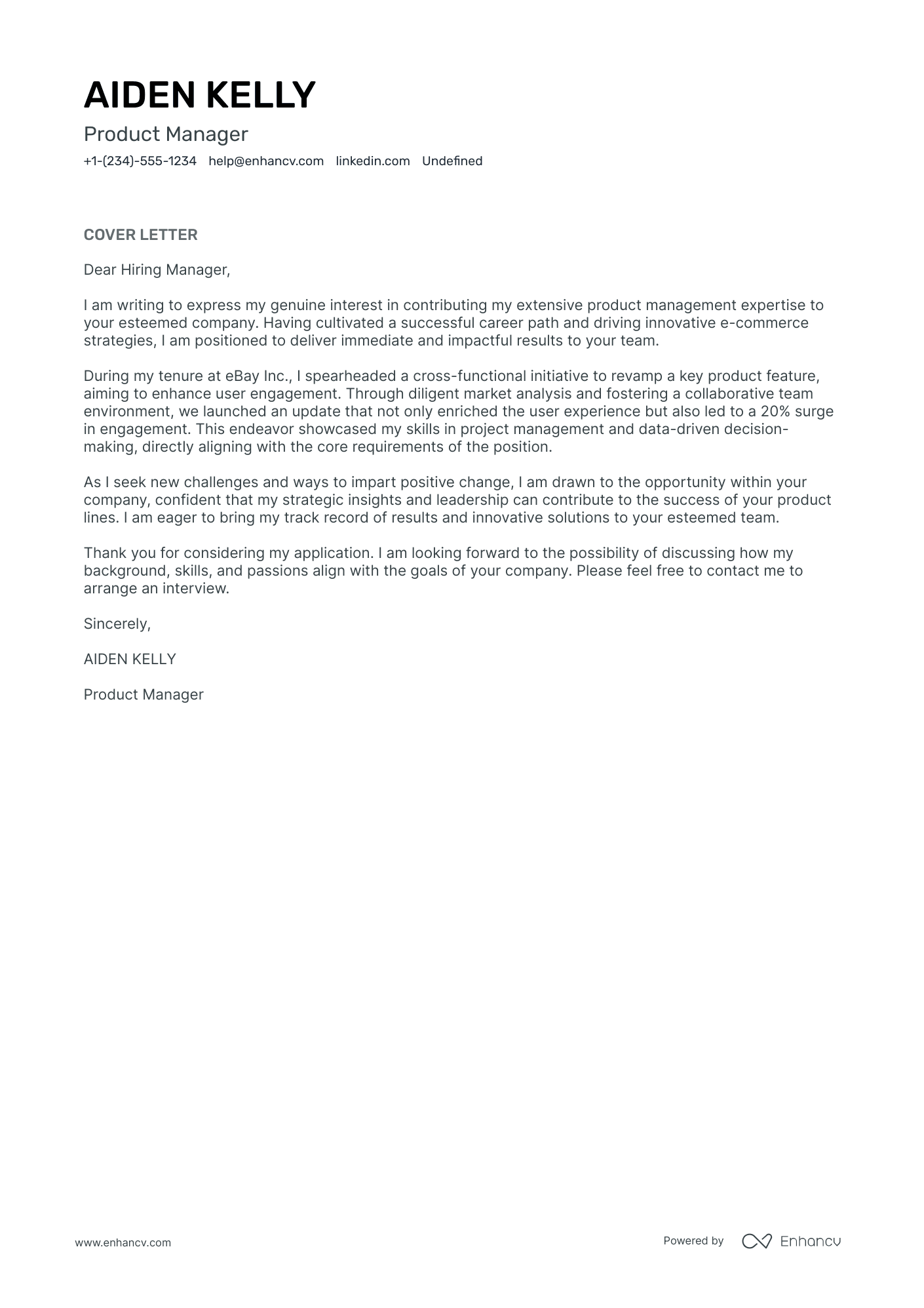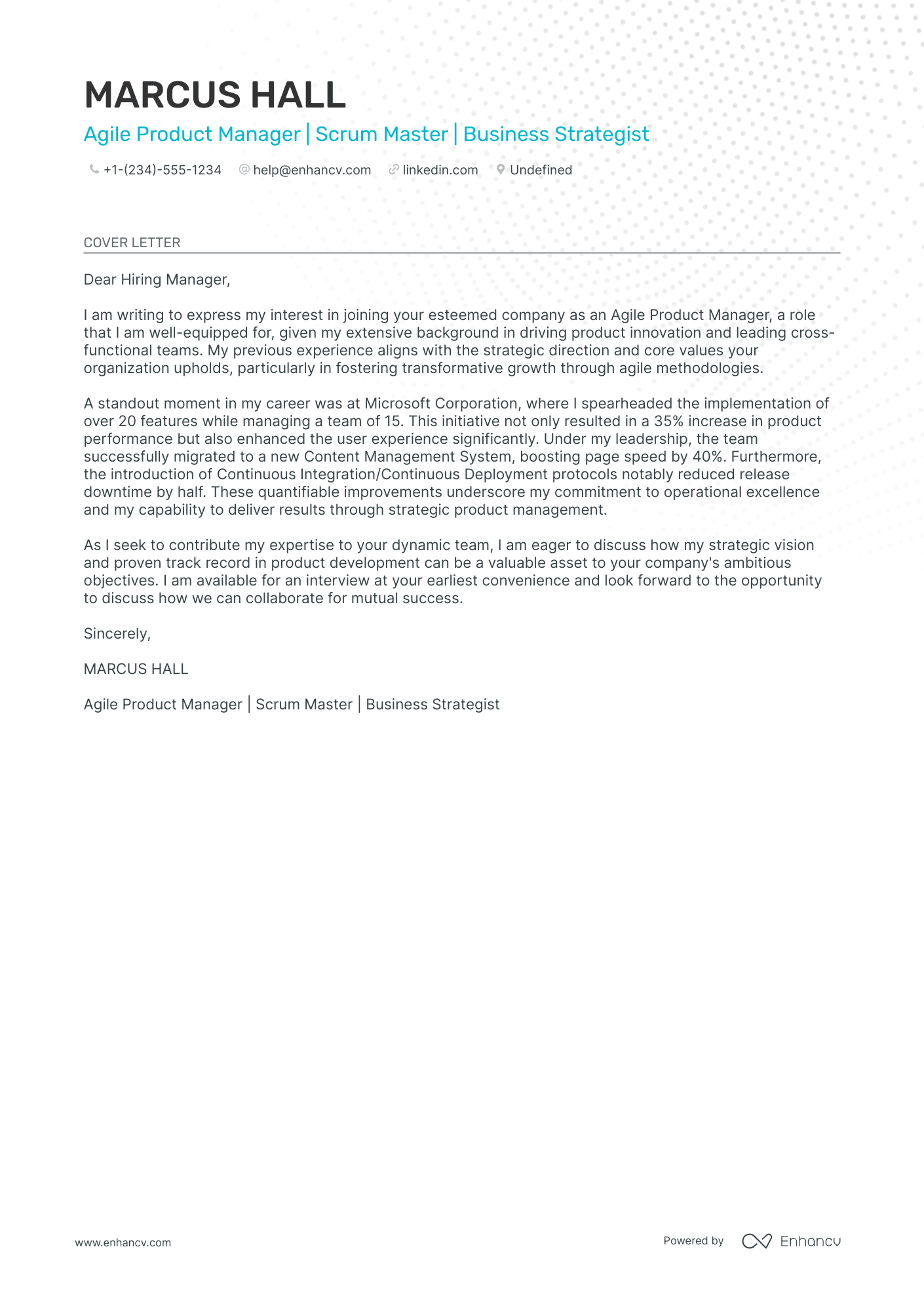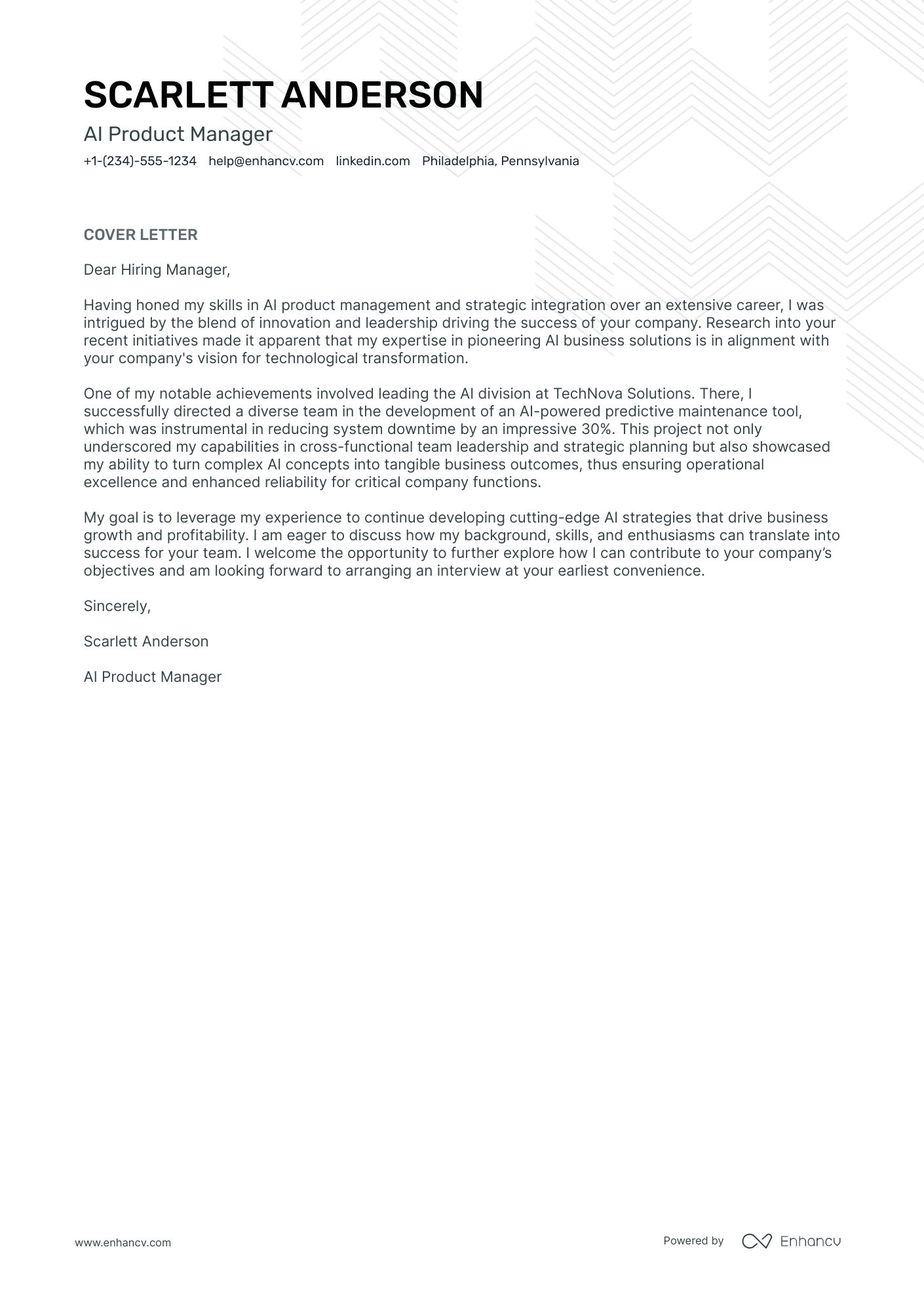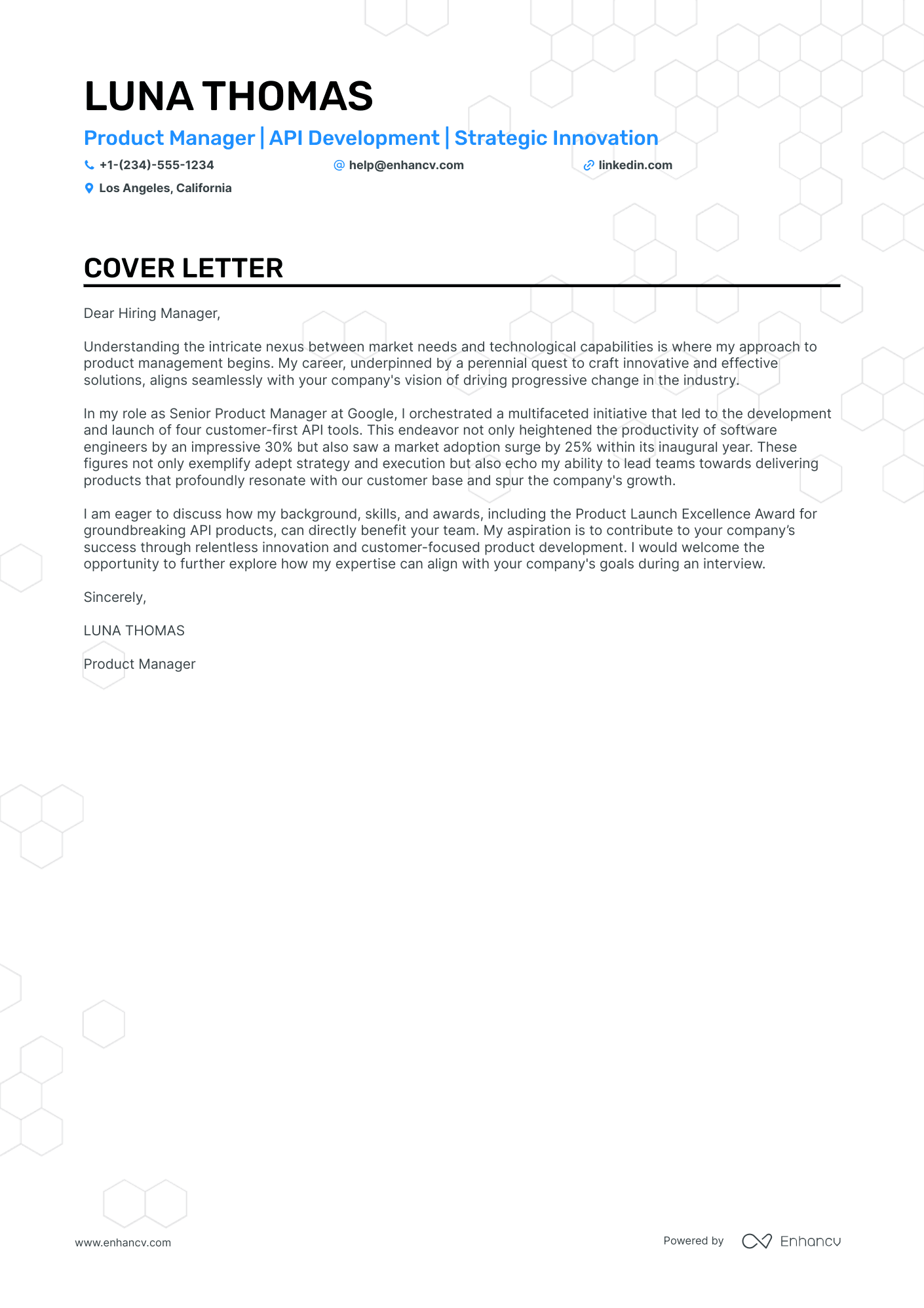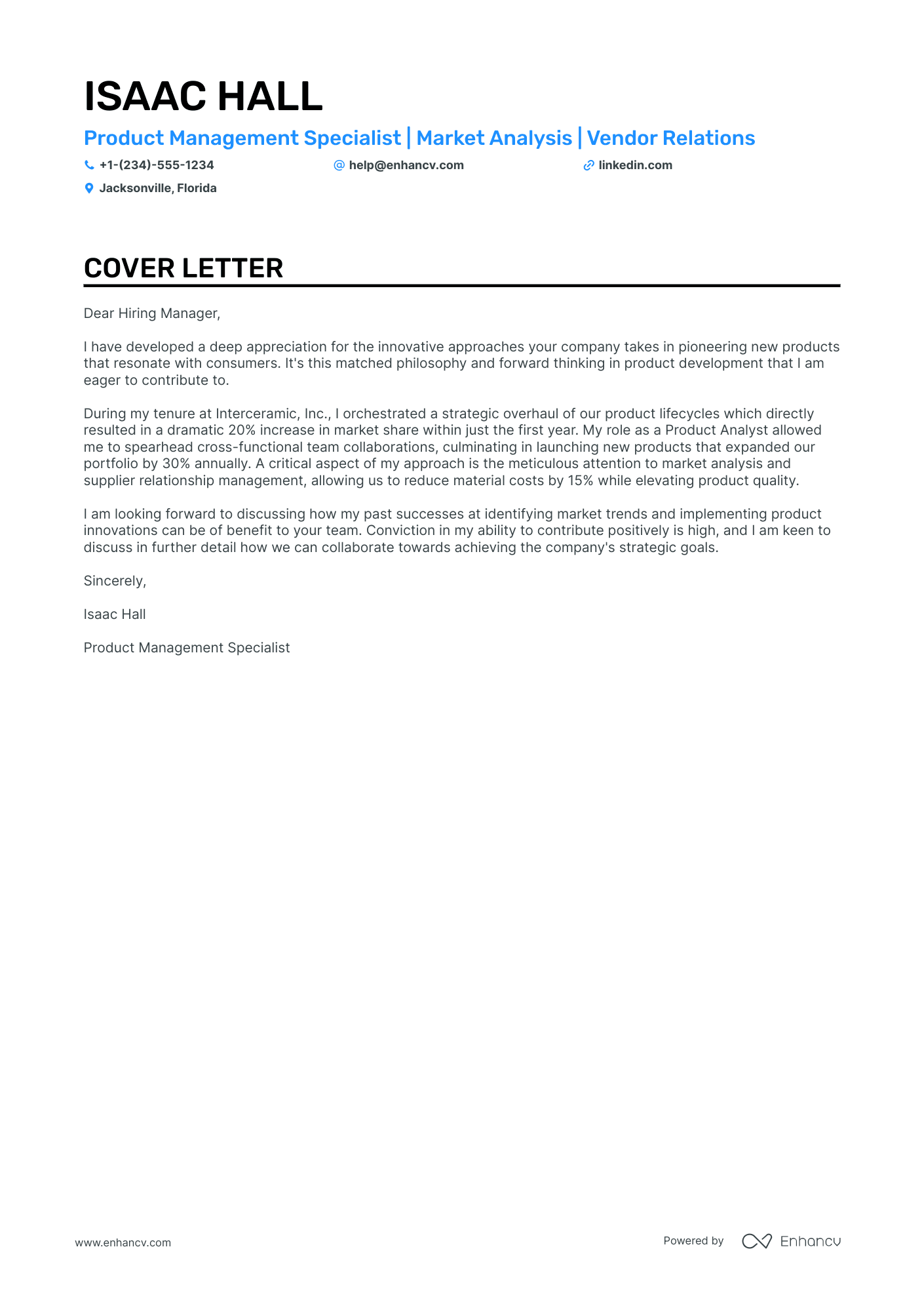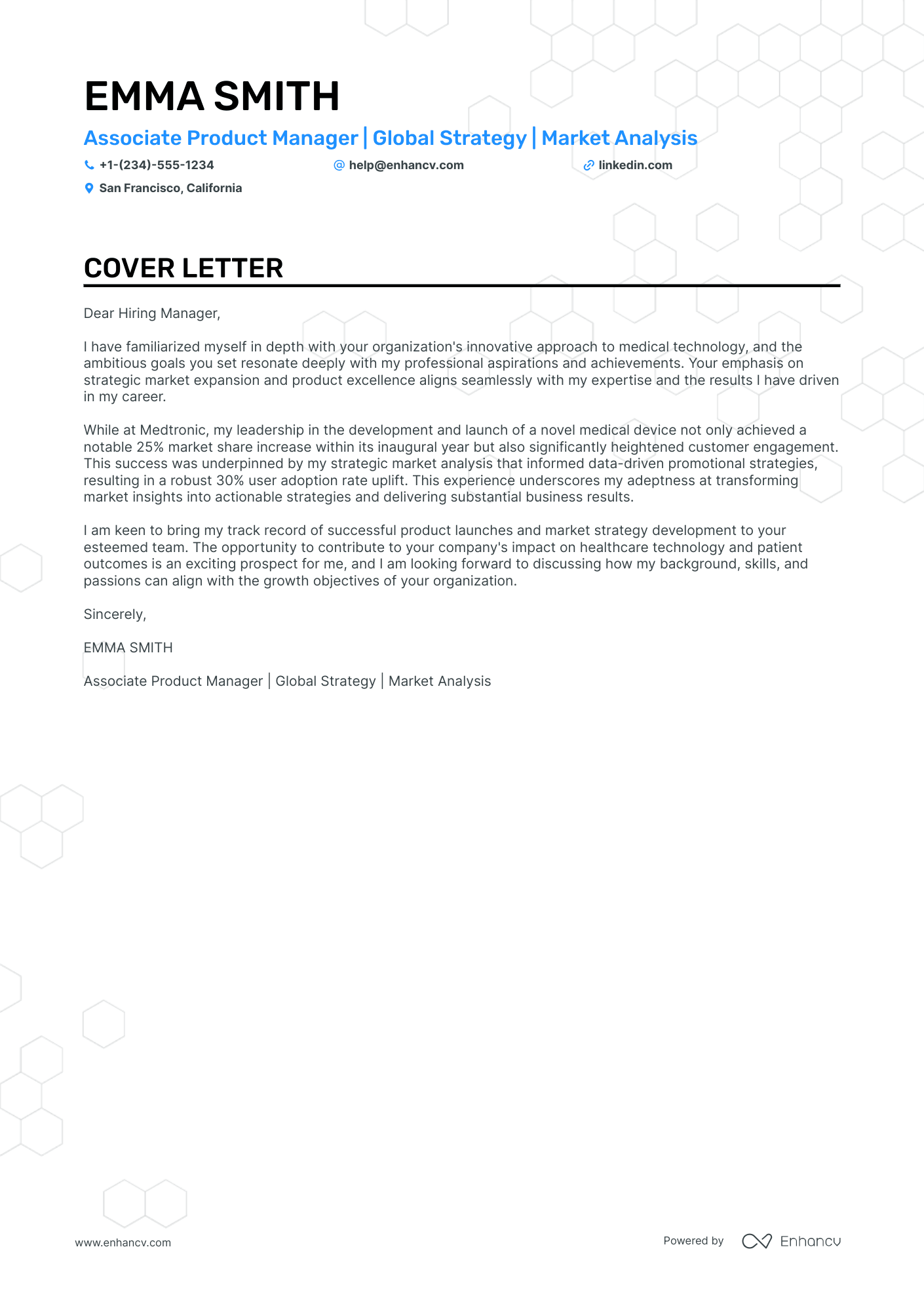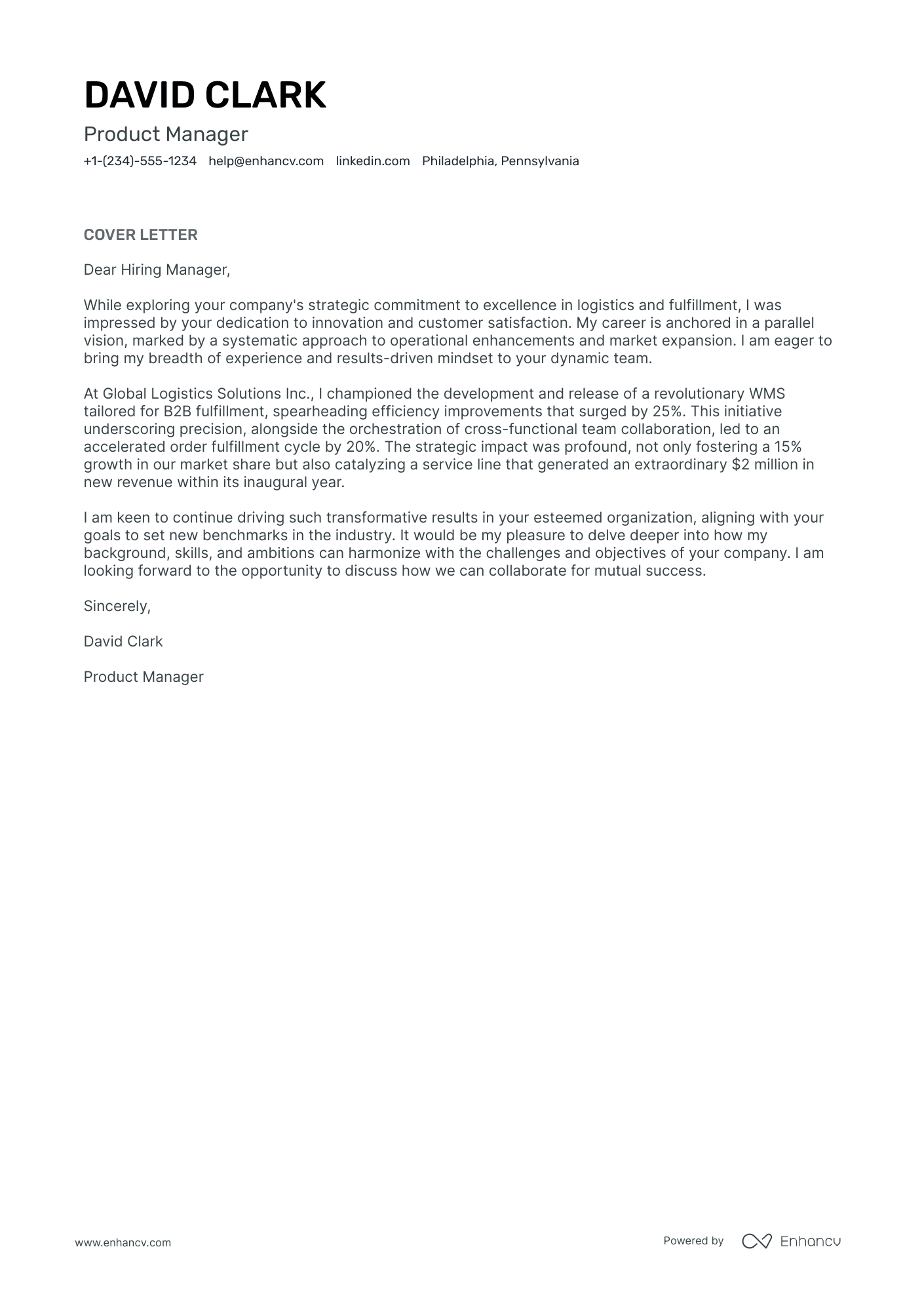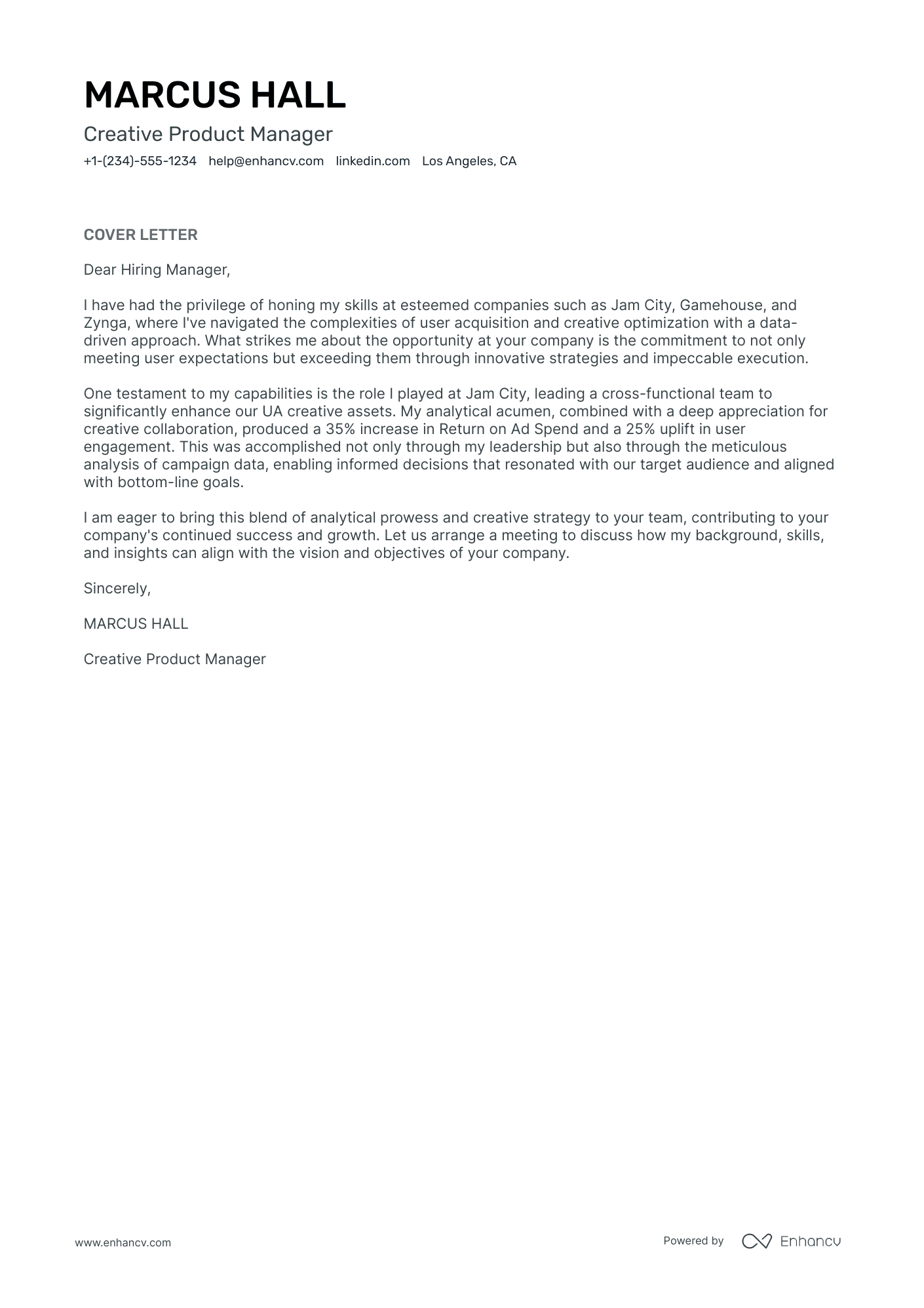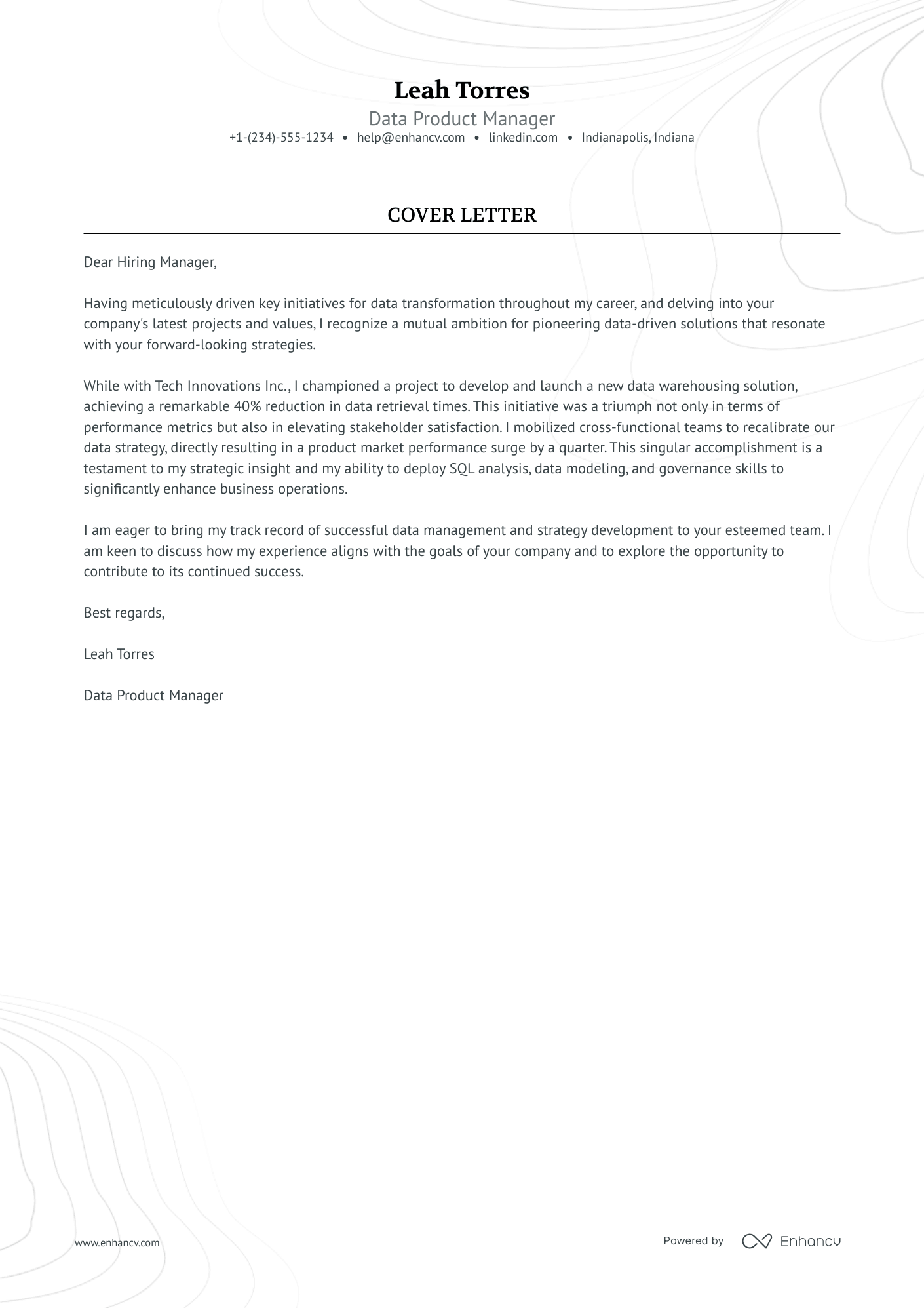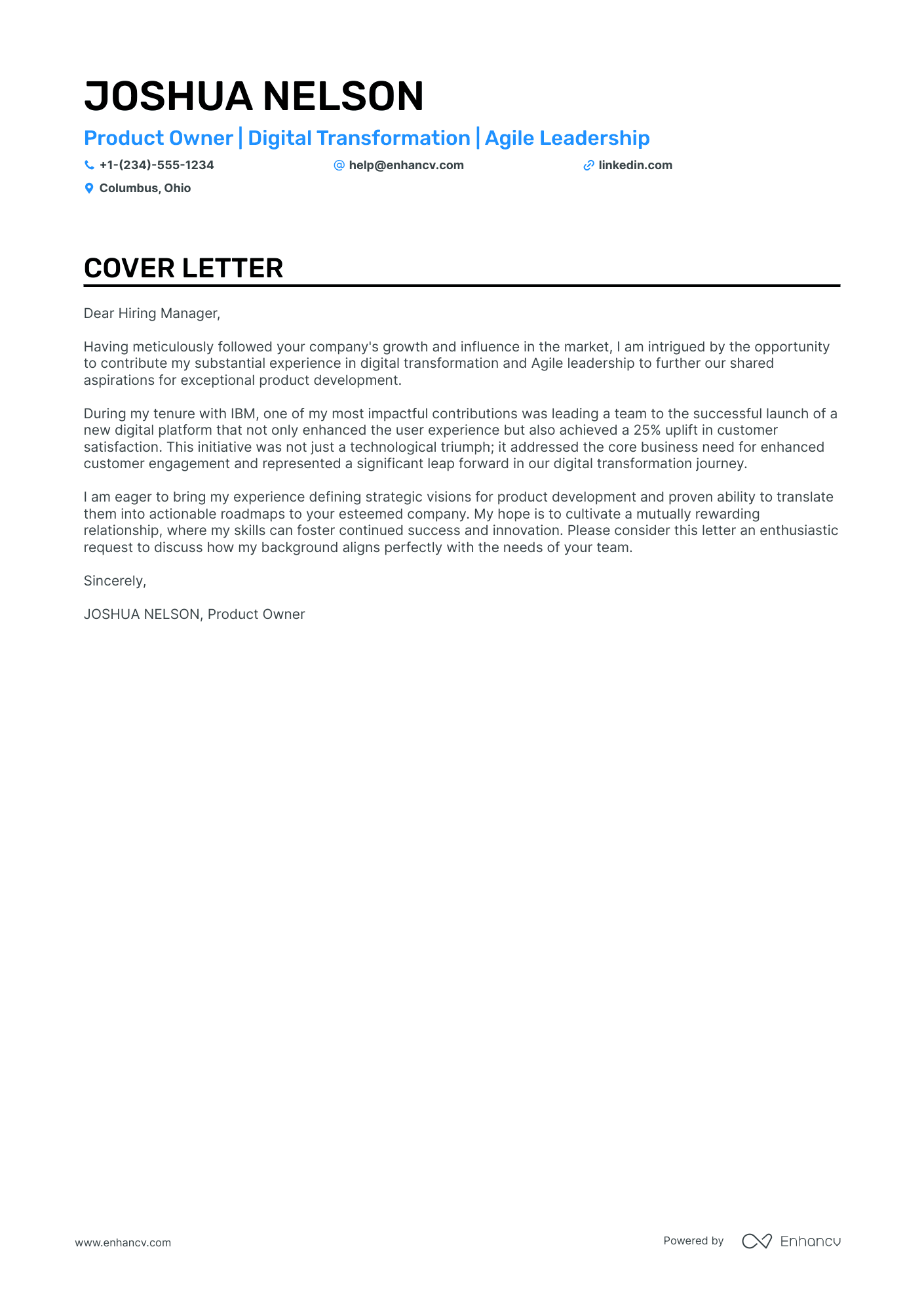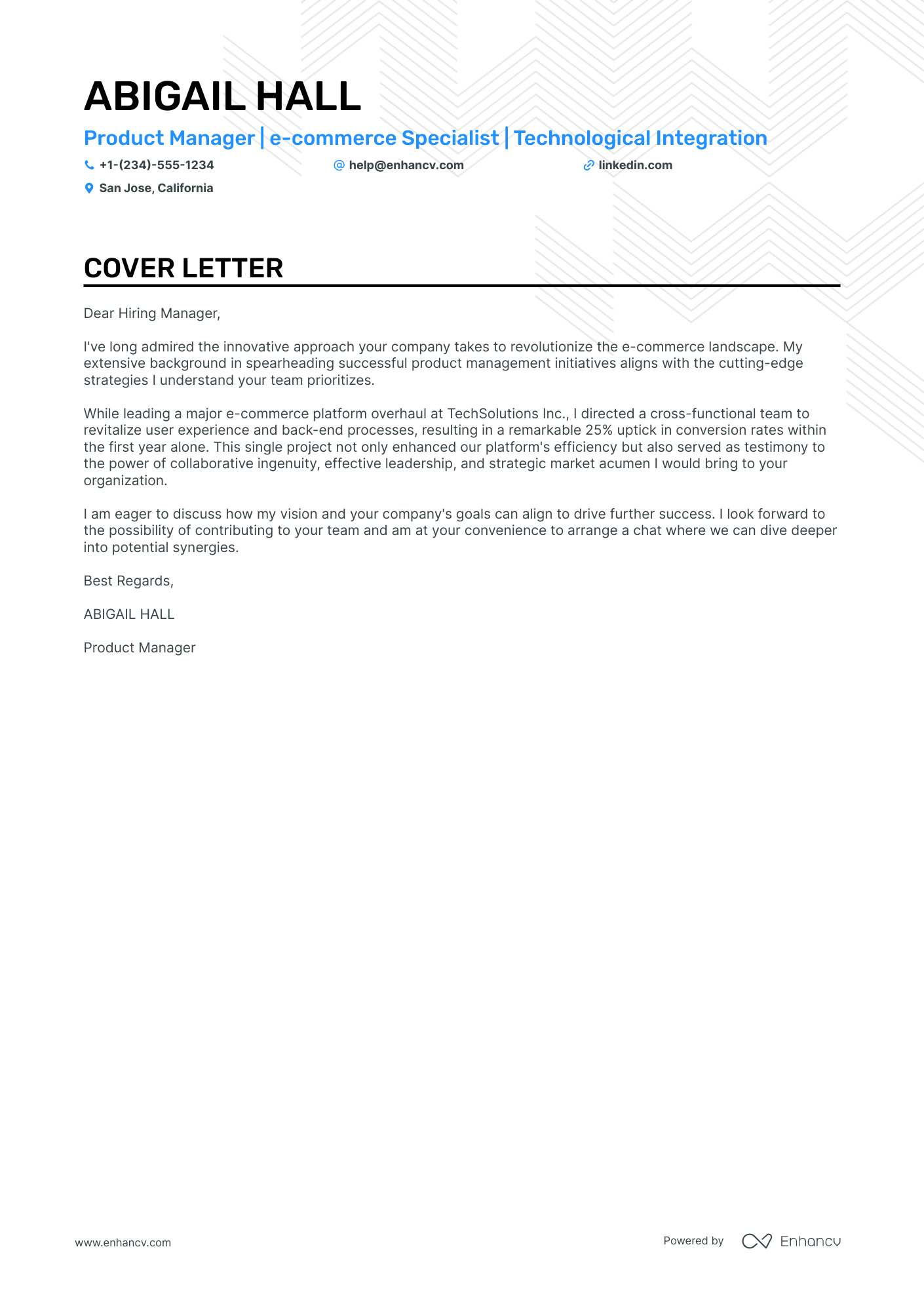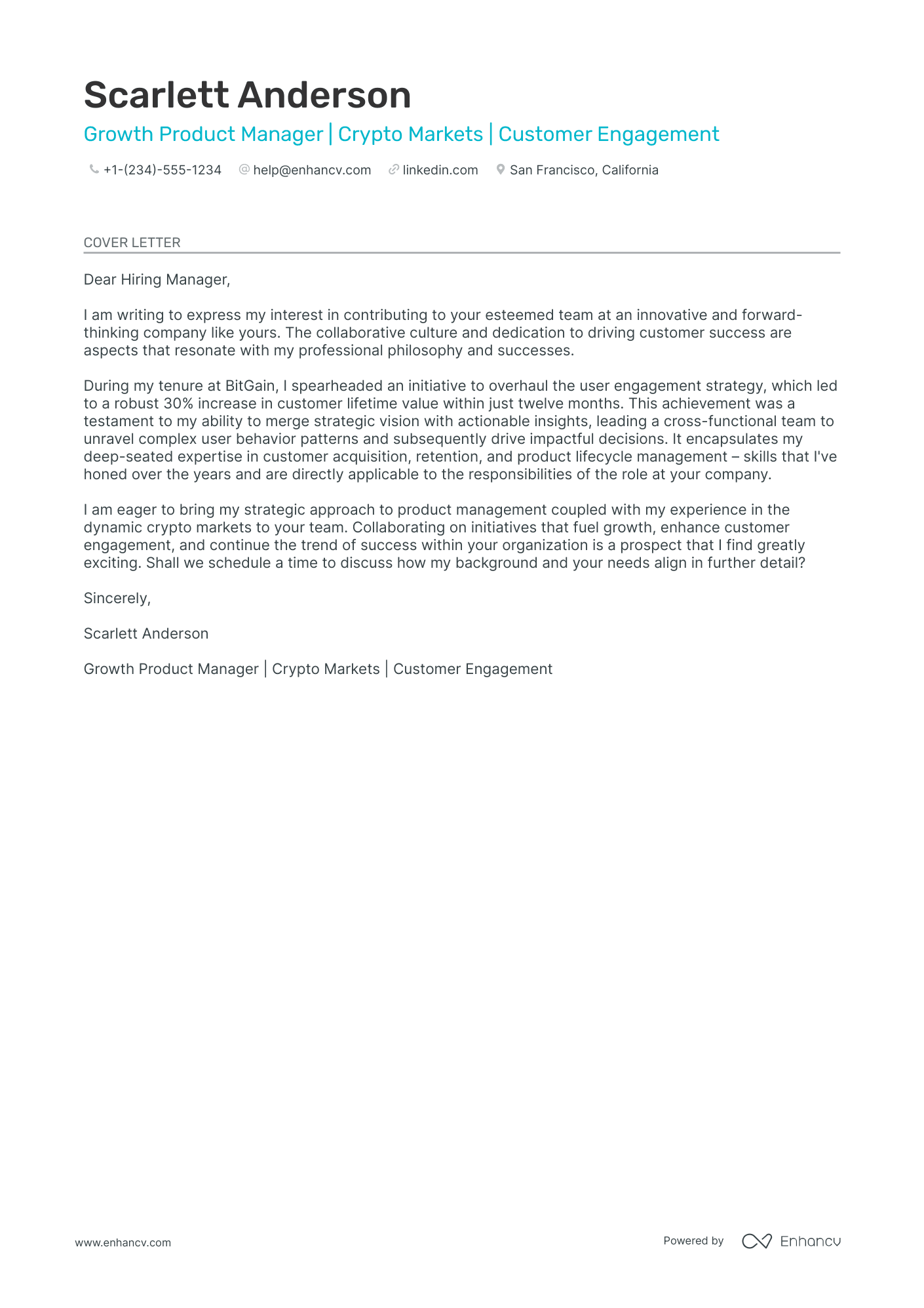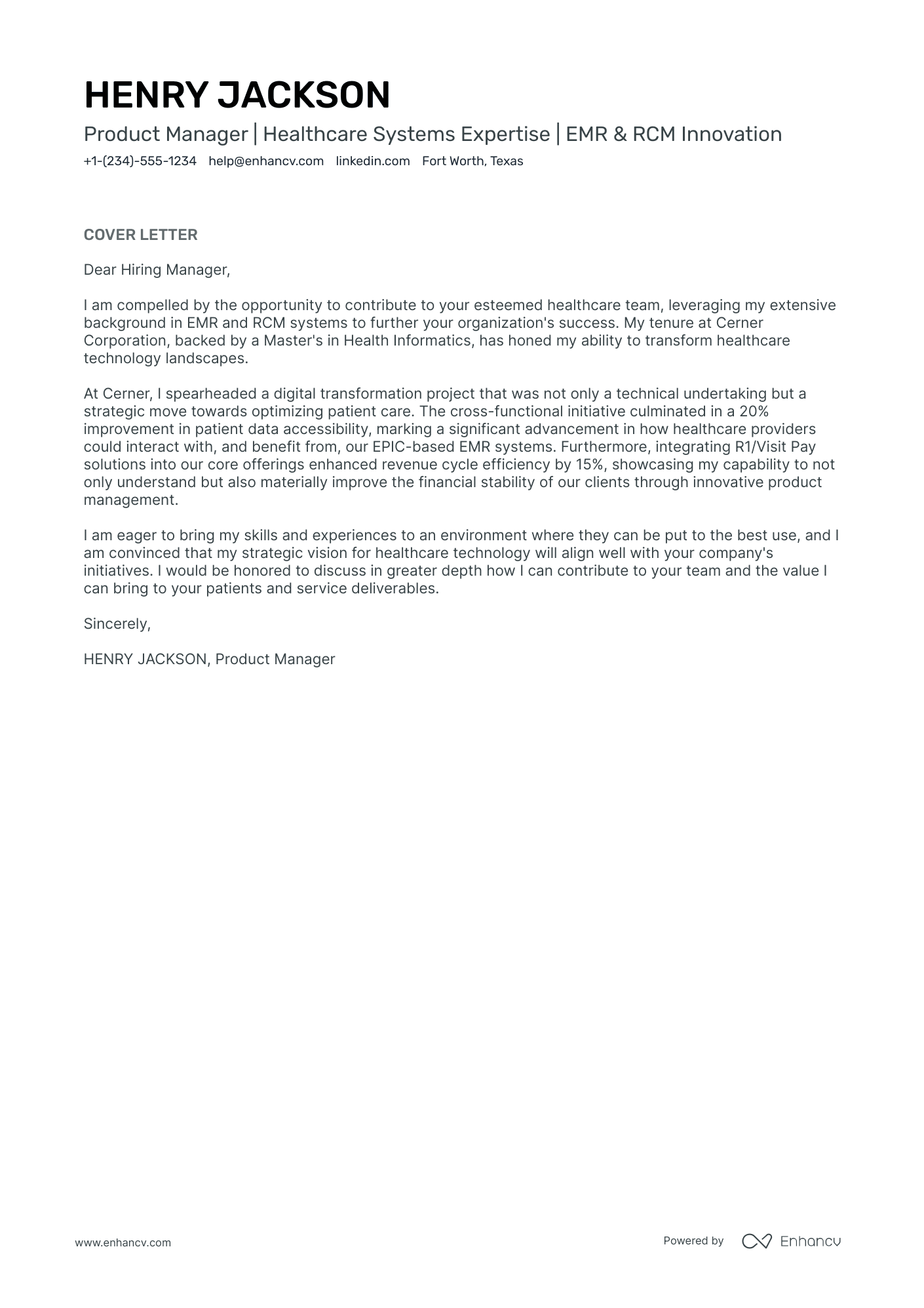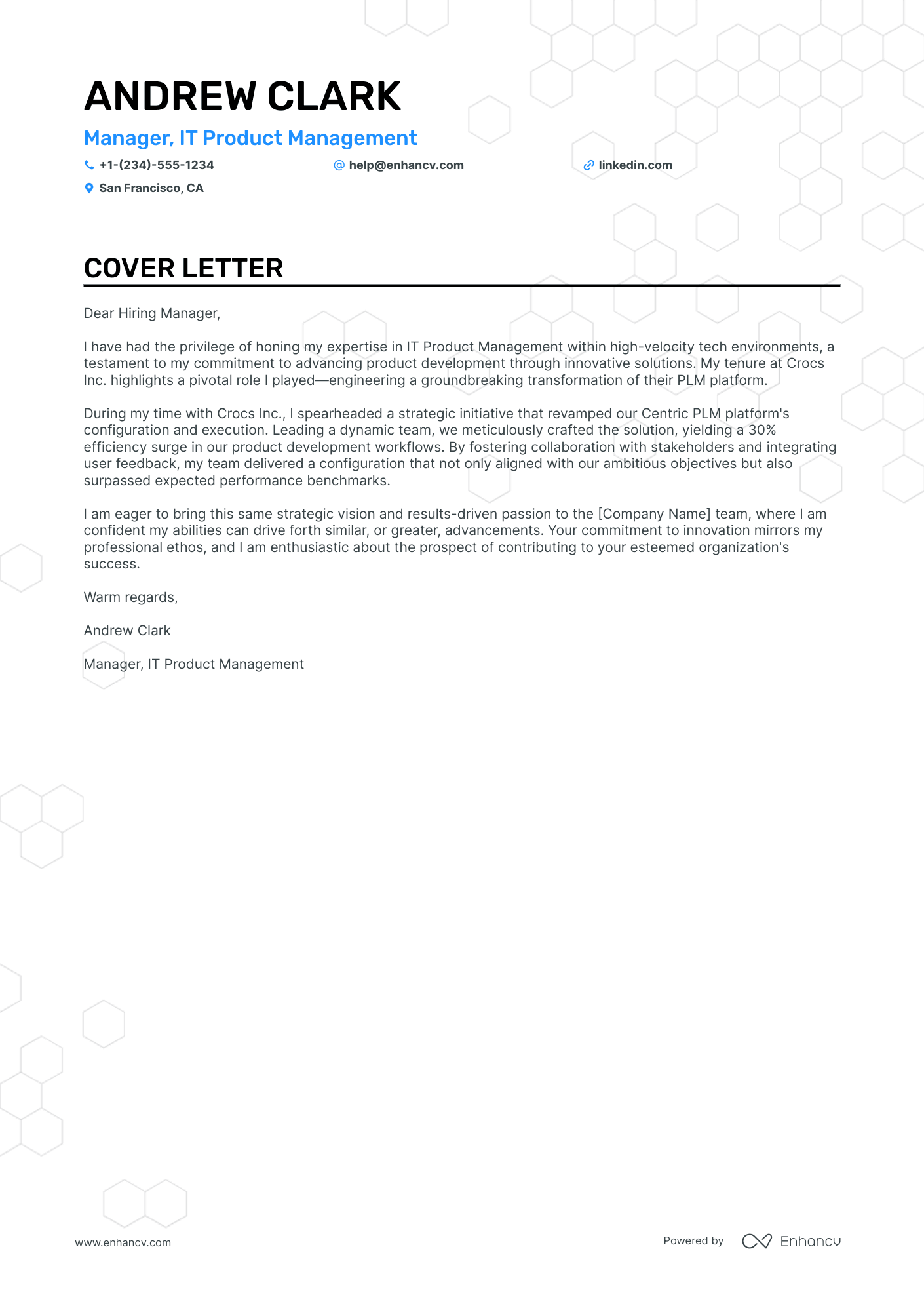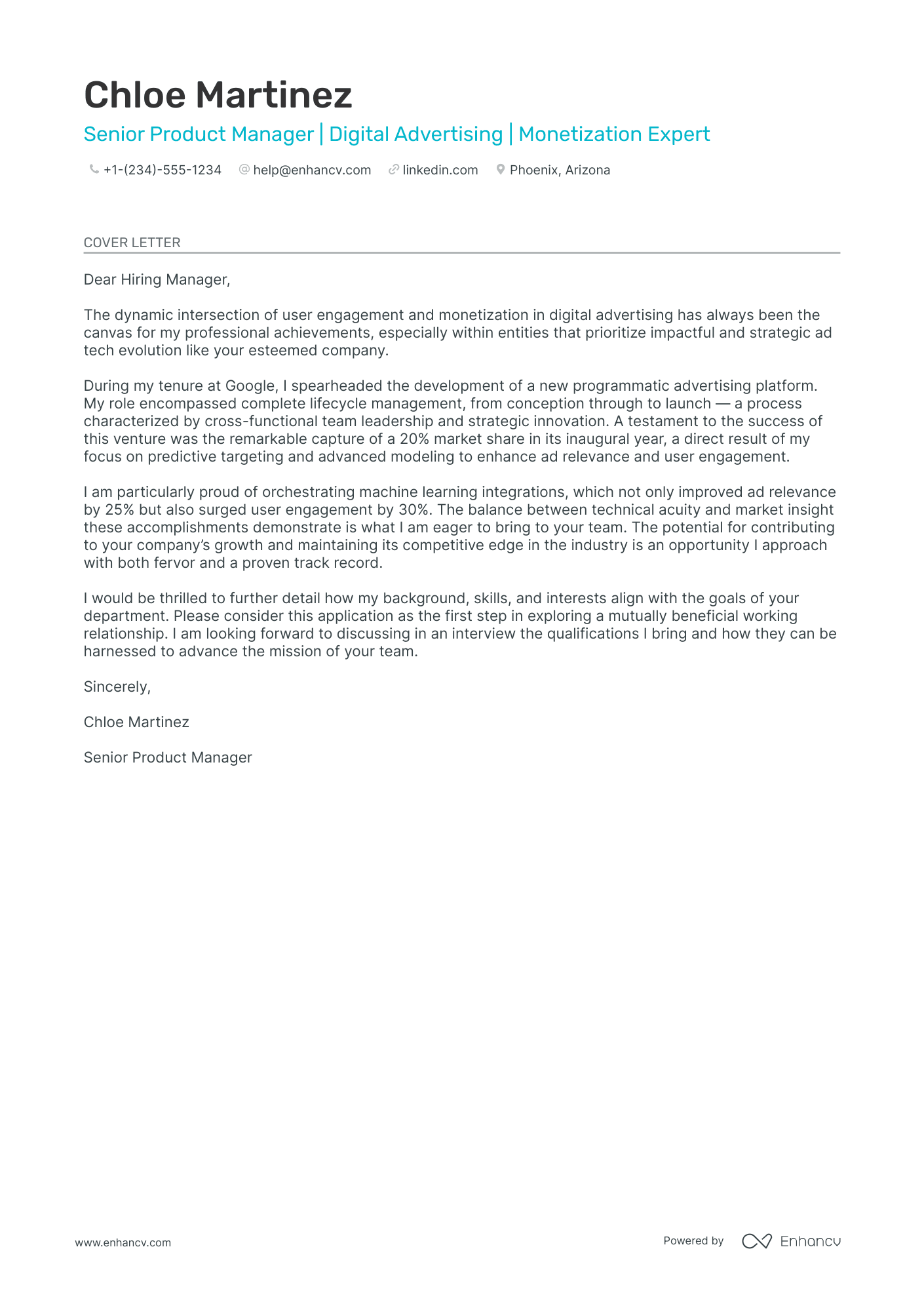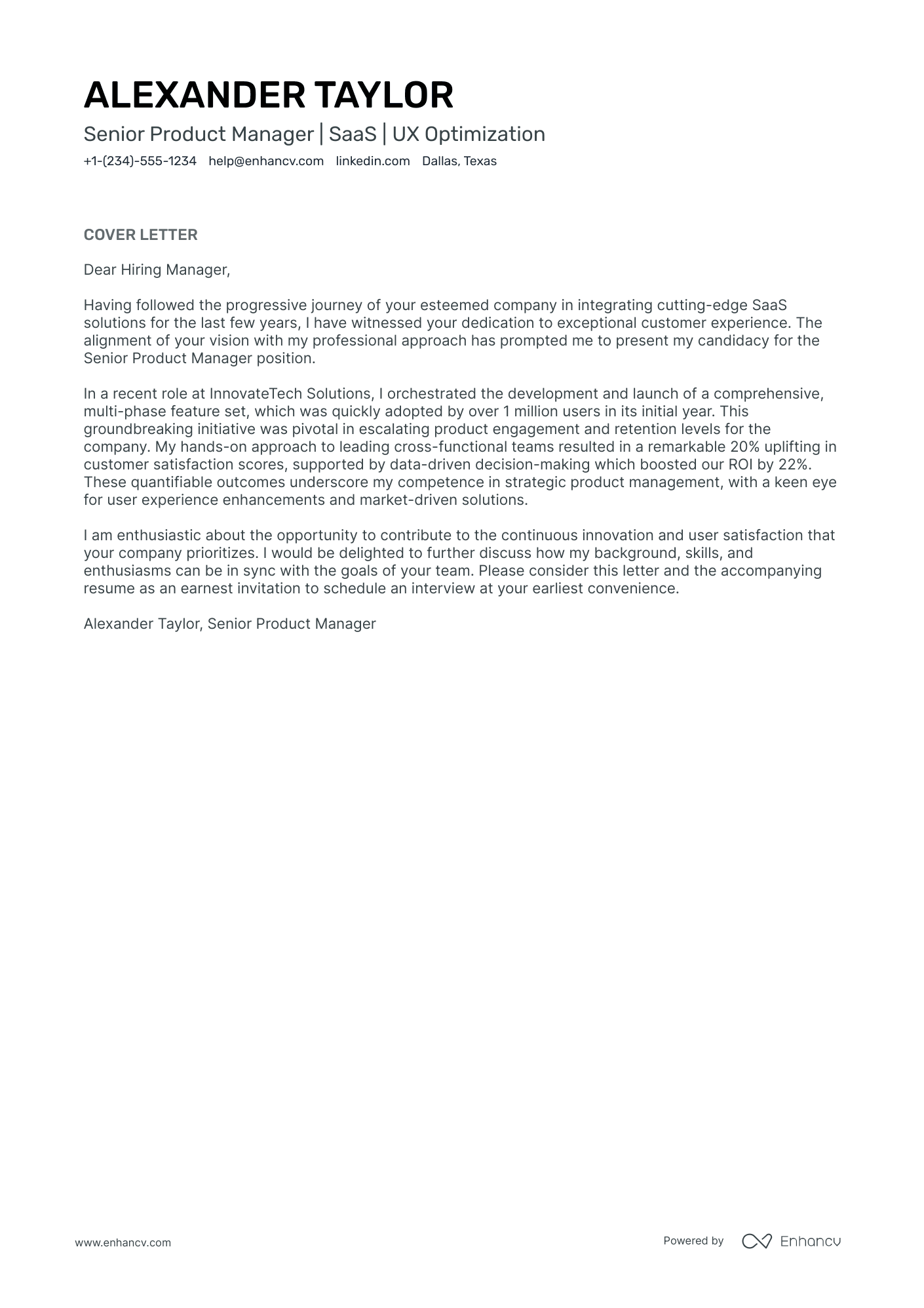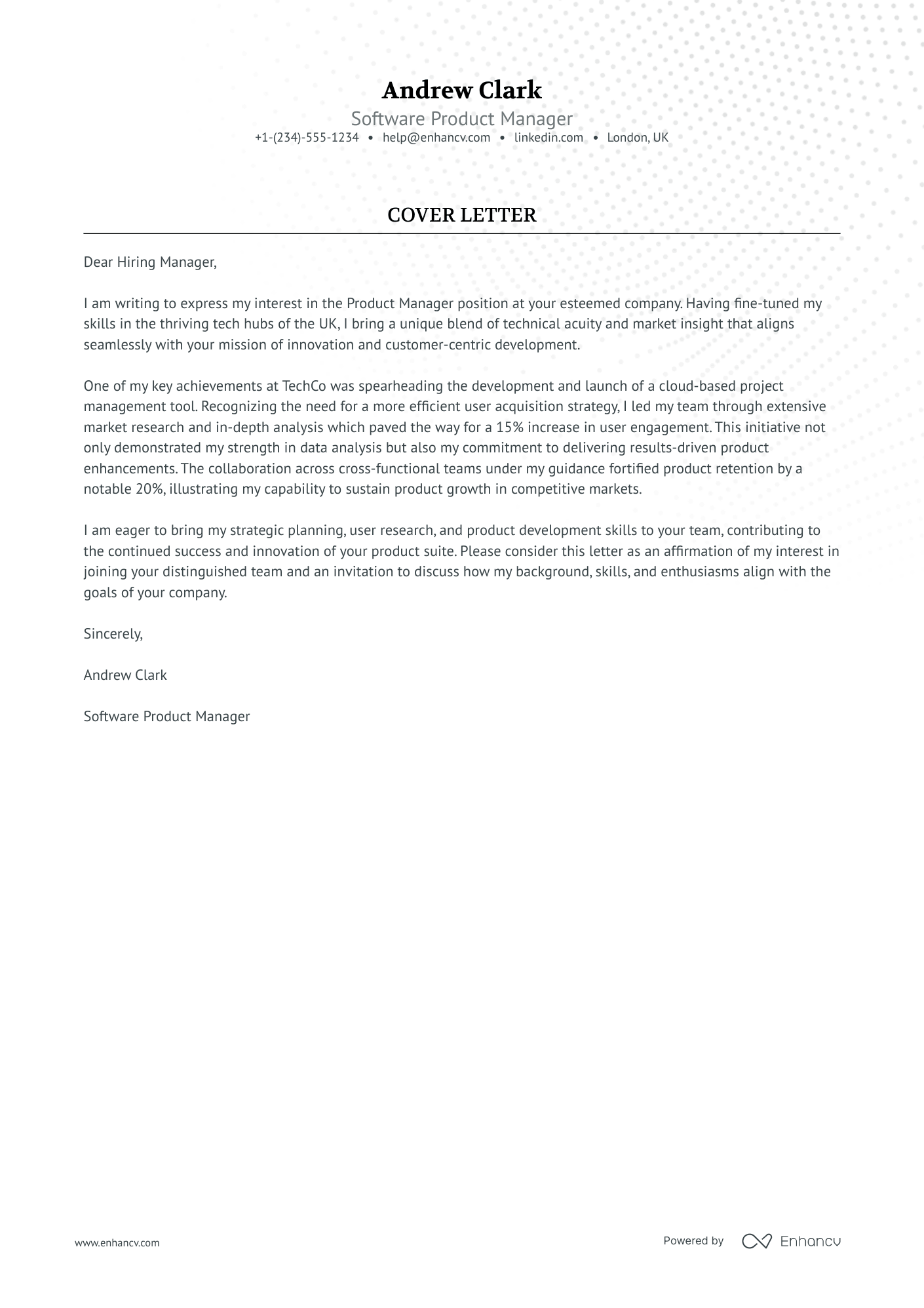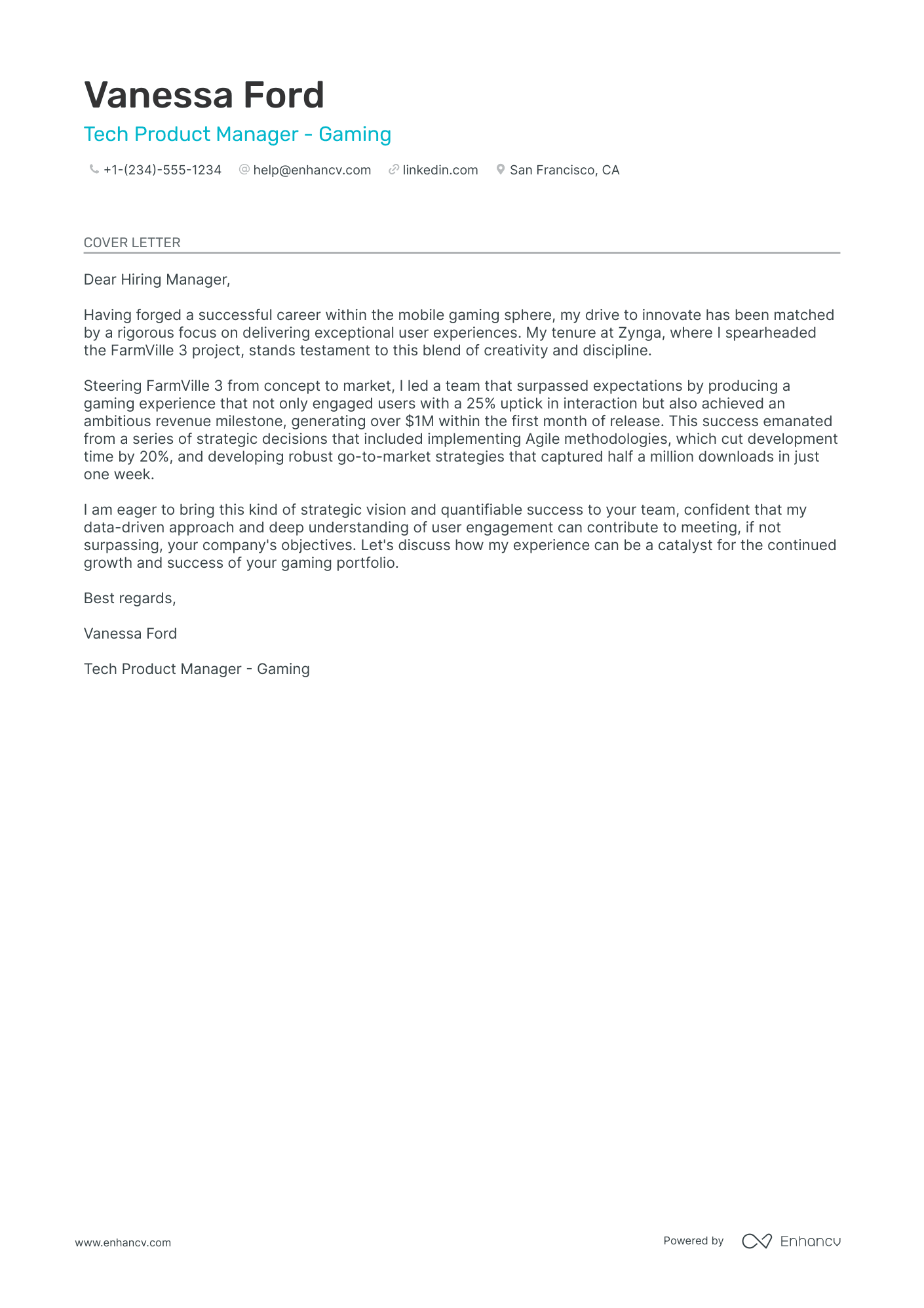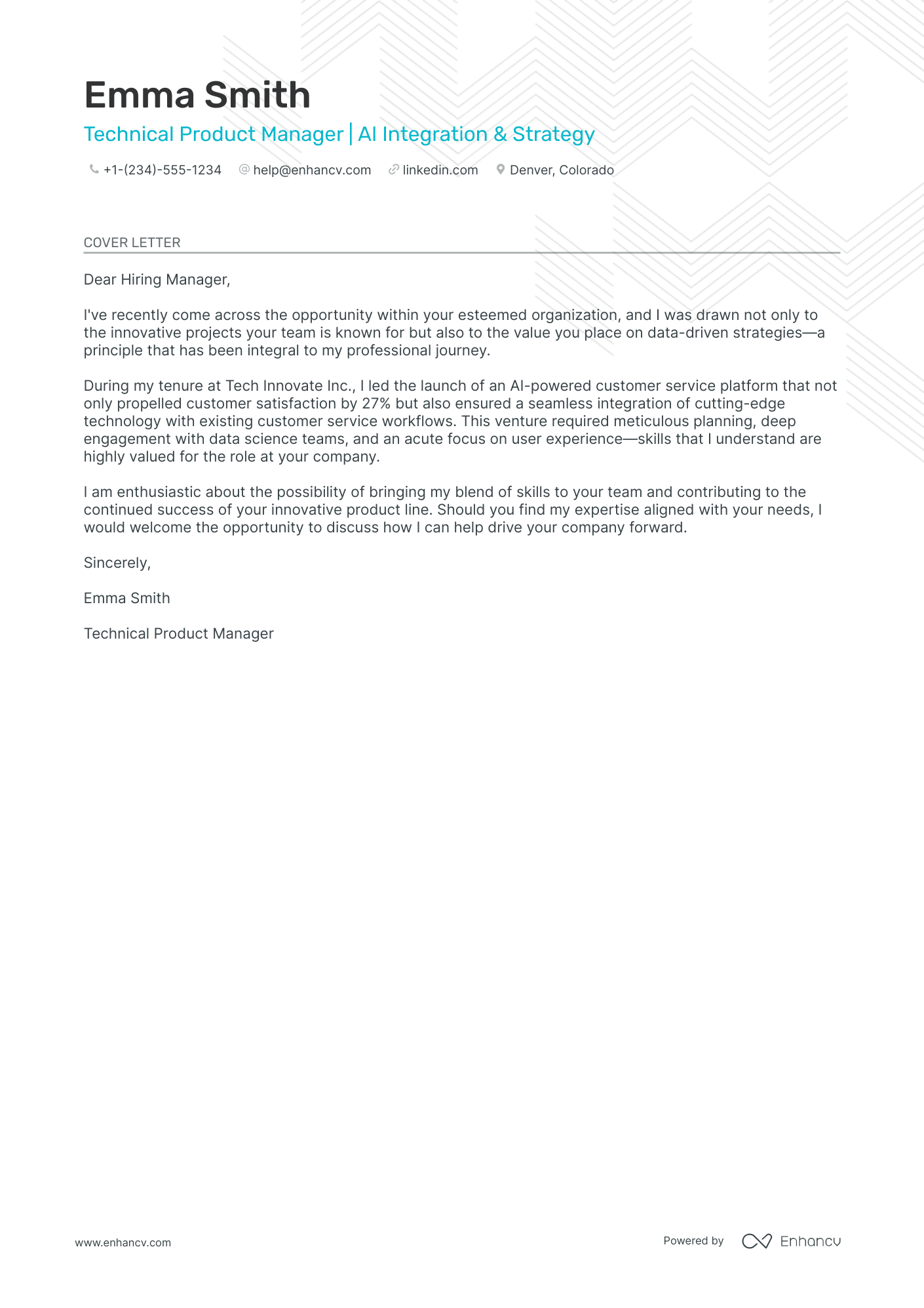Crafting the perfect Product Manager cover letter can be a stumbling block, especially after you've hit "apply" only to find out a cover letter is required. It's not just about echoing your resume. Instead, zoom in on your crowning professional achievement and weave a compelling narrative. Keep it crisp, dodge the clichés for authenticity, and remember, brevity is key—stick to one page that leaves them wanting more. Let's unlock the secrets to a standout cover letter together.
- Making excellent use of job-winning real-life professional cover letters;
- Writing the first paragraphs of your product manager cover letter to get attention and connect with the recruiters - immediately;
- Single out your most noteworthy achievement (even if it's outside your career);
- Get a better understanding of what you must include in your product manager cover letter to land the job.
Let the power of Enhancv's AI work for you: create your product manager cover letter by uploading your resume.
If the product manager isn't exactly the one you're looking for we have a plethora of cover letter examples for jobs like this one:
- Product Manager resume guide and example
- Program Coordinator cover letter example
- Technical Project Manager cover letter example
- SAP Project Manager cover letter example
- Agile Program Manager cover letter example
- Project Controls Manager cover letter example
- Junior Project Manager cover letter example
- Associate Product Manager cover letter example
- SaaS Product Manager cover letter example
- Public Health Program Manager cover letter example
- Technical Program Manager cover letter example
Product Manager cover letter example
Luna Thomas
San Francisco, California
+1-(234)-555-1234
help@enhancv.com
- Demonstrating relevant past successes, such as the launch of a new product and its subsequent market penetration increase, to showcase results-driven capabilities and industry-specific experience.
- Highlighting leadership skills and collaborative teamwork by managing a diverse group, ensuring timely and cost-effective project delivery, which is critical for a Product Manager role.
- Emphasizing customer-centric approach by mentioning the enhancement in customer satisfaction, which aligns with prioritizing user experience—a key aspect of Product Management.
- Expressing alignment with the company's values and mission, creating a personal connection and showing the candidate's interest in not only the role but also the company's ethos.
Five tips on formatting your product manager cover letter
Do you want to make a good impression on recruiters and, at the same time, follow the best industry advice on writing your product manager cover letter?
Make sure to include the following:
- Header and Salutation;
- Introductory paragraph;
- Body paragraph;
- Closing paragraph;
- Signature (this one is up to you).
Remember to use the same modern, simple font for your product manager cover letter as you did for your resume (e.g. Lato, Rubik, etc.)
Ensure your product manager cover letter is single-spaced and is wrapped around a one-inch margin, like in our cover letter templates.
Once completed, use our cover letter builder to export your product manager cover letter in the best format to keep your information intact - PDF.
At the end of the day, your product manager cover letter won't be assessed by the Applicant Tracker System (ATS) software, but by the recruiters. Your information should thus be legible, organized, and follow a structured logic.
The top sections on a product manager cover letter
- Header: This includes the candidate's contact information, date, and the recruiter's details, laying the foundation for a professional and well-formatted cover letter specific to the product management field.
- Greeting: A personalized greeting shows attention to detail and effort in addressing the appropriate hiring manager or team, demonstrating the interpersonal skills vital in product management.
- Introduction: This should capture the recruiter's attention by concisely stating the candidate's interest in the product manager position and highlighting their relevant experience or passion for the product.
- Body: With a focus on previous product management successes, this section should outline key achievements using metrics and examples, reflecting one’s ability to make data-driven decisions and lead cross-functional teams effectively.
- Closing: The candidate reiterates their enthusiasm for the role, mentions the potential for contributing to the company’s product vision, and thanks the recruiter, showing professionalism and a forward-thinking mindset characteristic of a skilled product manager.
Key qualities recruiters search for in a candidate’s cover letter
- Demonstrated experience in leading cross-functional teams: Effective product managers must collaborate with various teams such as engineering, design, sales, and marketing to ensure product success.
- Strong analytical skills: Product managers analyze market trends, user feedback, and performance data to inform product strategy and decision-making.
- Excellent communication and interpersonal skills: They must clearly articulate product vision, features, and priorities to stakeholders at all levels, as well as listen to and incorporate feedback constructively.
- A track record of successful product launches: Recruiters look for practical experience in bringing products to market and managing the product lifecycle from ideation to release and beyond.
- User-centric mindset: Product managers prioritize the user experience and advocate for the needs of the customer in the product design and improvement process.
- Technical expertise relevant to the product: While not always required, having a technical background or understanding can help in working closely with development teams and making informed decisions on technical issues.
What matters most when tailoring your product manager cover letter salutation
Your product manager cover letter greeting should feel welcoming to recruiters.
Use their first name (e.g. "Dear Marshall" or "Dear Sara"), if you've previously been in touch with the hiring manager and are on a more friendly basis.
If this is the first time you're contacting the recruiters, start your product manager cover letter with:
- their last name (e.g. "Dear Ms. Ali" or "Dear Mr. Stevens") - look up who's the hiring manager for the role on social media or the company website;
- generalized greeting (e.g. "Dear HR Team") - just don't use "To whom it may concern" or "Dear Sir/Madam".
List of salutations you can use
- Dear Hiring Manager,
- Dear [First Name Last Name],
- Dear [Job Title],
- Dear [Company Name] Team,
- Dear Selection Committee,
- Dear [Department Name] Hiring Team,
How to start your product manager cover letter introduction
The opening paragraph of your product manager cover letter can seem like a real enigma.
Where do you start writing?
In your product manager cover letter introduction, focus on yourself by stating what:
- gets you motivated and excited about the role;
- you like best about the company, from culture to awards.
Write no more than two sentences, which are both authentic and show your enthusiasm for the opportunity.
The middle or body of your product manager cover letter body: a great instrument to tell a story
Now that you've set the right tone with the greeting and introduction of your product manager cover letter, it's time to get down to business.
Hear us out, the body of your product manager cover letter is the best storytelling instrument you have, in your job-hunting arsenal.
Writing the next three to six paragraphs, take the time to reassess the advert to discover job-crucial requirements.
Next, choose one accomplishment that covers those key skills and talents.
Use precisely that achievement to tell an exciting story of how you match the ideal candidate profile.
In the undertones of your story or product manager cover letter body, hint at the difference you'd make and sell your application as the perfect one for the job.
A sincere and original way to end your product manager cover letter
When writing their product manager cover letter, candidates tend to use one of these phrases, "Sincerely yours" or "I look forward to hearing from you".
Both statements show good manners, but your cover letter should end in a more actionable manner.
Write about:
- how you see yourself growing in the role/organization;
- the benefits you would bring about (you'd impress even more with tangible metrics);
- the next steps in the process (provide your availability for interviews).
Is it beneficial to mention that you have no experience in your product manager cover letter?
Lacking professional experience isn't the end of the world for your product manager cover letter.
Just be honest that you may not have had roles in the industry, but bring about so much more.
Like, your transferable skills, attained thanks to your whole work and life experience (e.g. the skills your summer spent working abroad taught you).
Or, focus on what makes you, you, and that one past success that can help you stand out and impress recruiters (think of awards you've attained and how they've helped you become a better professional).
Alternatively, write about your passion and drive to land the job and the unique skill set you would bring to enhance the workplace culture.
Key takeaways
Writing your product manager cover letter doesn't need to turn into an endless quest, but instead:
- Create an individual product manager cover letter for each role you apply to, based on job criteria (use our builder to transform your resume into a cover letter, which you could edit to match the job);
- Stick with the same font you've used in your resume (e.g. Raleway) and ensure your product manager cover letter is single-spaced and has a one-inch margin all around;
- Introduce your enthusiasm for the role or the company at the beginning of your product manager cover letter to make a good first impression;
- Align what matters most to the company by selecting just one achievement from your experience, that has taught you valuable skills and knowledge for the job;
- End your product manager cover letter like any good story - with a promise for greatness or follow-up for an interview.
Product Manager cover letter examples
Explore additional product manager cover letter samples and guides and see what works for your level of experience or role.
By Experience
Product Manager Intern
Senior Product Manager
Junior Product Manager
Entry-Level Product Manager
By Role
